
VOICES, is a forum that highlights the expertise of those who make up and support the organization. WFPG members and partners are invited to submit blog posts on international affairs and foreign policy topics, women's leadership, and career advancement. Posts represent the reflections and personal views of members and guest bloggers and not those of their employers or of the WFPG. Interested in submitting a post? Guidelines | Membership
Twenty-two years after the UN Security Council Resolution 1325, the world continues to face barriers to the participation of women in peace and security processes. Over the last year, we’ve seen the rights of women in Afghanistan restricted and stripped away by the Taliban, we’ve observed some of the largest protests surface in Iran for women’s freedoms, and we’ve watched war crimes of sexual assault and rape take place during Russia’s War in Ukraine. In light of these topics, the Women’s Foreign Policy Group held a “Beyond the Headlines” series event on December 15, with a panel of women at the forefront of the Women, Peace, and Security (WPS) agenda. We heard from Ambassador Melanne Verveer, Executive Director of the Georgetown Institute for Women, Peace, and Security; Sahana Dharmapuri, One Earth Future Foundation; Rose Gottemoeller, former Deputy Secretary General of NATO; Ivanna Klympush-Tsintsadze, Member of Parliament, Ukraine, Chair of the Parliamentary Committee on Integration of Ukraine to the EU; and Dr. Kathleen Kuehnast, US Institute of Peace. The WPS framework was established by the UN Security Council with the first resolution (Resolution 1325), which “reaffirms the important role of women in the prevention and resolution of conflicts, peace negotiations, peace-building, peacekeeping, humanitarian response and in post-conflict reconstruction and stresses the importance of their equal participation and full involvement in all efforts for the maintenance and promotion of peace and security. Resolution 1325 urges all actors to increase the participation of women and incorporate gender perspectives in all United Nations peace and security efforts. It also calls on all parties to conflict to take special measures to protect women and girls from gender-based violence, particularly rape and other forms of sexual abuse, in situations of armed conflict.” Resolution 1325 has been followed by nine additional resolutions that focus on women’s involvement in peace and security, conflict resolution, and achieving sustainable peace and relief and recovery post-conflict. The additional resolutions also address the disproportionate impact of war on women, including sexual violence as a weapon of war. The WFPG panel discussion focused on several key topics: current conflicts, especially Russia’s War in Ukraine; post-conflict transitions; and progress and outlooks, specifically in bureaucratic institutions. Russia’s War in Ukraine: Klympush-Tsintsadze also spoke on the disproportionate impacts of war on women, specifically in dealing with war crimes like systematic rape. A key point she made is the need to ensure that there’s an international tribunal established for crimes of aggression. While there are existing international organizations on this issue, war crimes take a long time to be prosecuted, leaving victims and survivors without recompense for many years. Instead, she explained the need for a special international treaty to bring down authority figures that are involved in these crimes of aggression in a quicker and more just way. Post-Conflict Transitions: Dr. Kathleen Kuenast shared her thoughts, “A society is still coming out of one identity and hasn’t created the post-conflict identity, which means that women do not have their rights secured yet.” Afghanistan is an example of where the international community pulled out of the conflict and now the female population has had their rights stripped away. Dr. Kuehnast explained how rights are critical for sustainable development in education, economic involvement, political participation, etc. It’s also necessary for international organizations to have all genders at the table in order to build a stable society after conflicts. In the case of Ukraine, when the war concludes, there will be a need for assistance from the international community to ensure a stable post-conflict society. Gottemoeller discussed how the international community and Ukraine will need to address both the political and social dimensions in order to transition into a successful post-conflict society. For instance, we will have to take into account the number of arms in the country, the corruption, and the issues of trafficking. She highlights that we need to include women in every aspect of the discussions. Progress and Outlooks: On the other hand, we still see barriers from democratic countries, including our own. “Where is the Department of Defense at with progress? It seems like there is a lack of progress at the Pentagon while places including the armed forces across NATO have really pushed the WPS agenda,” asked Ambassador Verveer. A former advisor to USAID and NATO, Dharmapuri responded with discussion on how with a lack of commands from higher-ups in bureaucratic places like the DOD, State Department, and USAID, it will be challenging for government employees to implement plans. We can see that leadership at the top really matters, so as progress in all areas is driven by the chain of command, there needs to be a push for implementation at every level (strategic, operational, tactical) in order for those who are staffing the projects to implement these plans. We see bureaucratic pushback again where the US requires a ⅔ majority in the Senate to ratify the ‘Convention on the Elimination of All Forms of Discrimination Against Women.’ The panelists shared their support for the treaty and expressed its importance as a tool for holding governments accountable. The US is one of the only six other countries (Iran, Sudan, Somalia, Nauru, Palau and Tonga) of 194 to have not ratified it. The panelists strongly expressed their encouragement that the US should be on the side of getting the treaty passed, but “regrettably don’t see it happening any time soon.” Looking forward to 2023, Dharmapuri vocalized that the US has to keep pushing on WPS implementation and gaining political will for the national security strategy to include more WPS language. Currently, in Resolution 1325, there is nothing that requires continuous action to review and renew WPS strategies after 2023. In order to ensure future discussion of the WPS agenda, Dharmapuri suggests an amendment to the WPS Act that requires strategies and implementation plans every two to four years. As for conflicts and their transitions, specifically the war in Ukraine, Klympush-Tsintsadze highly suggested a greater need to train the security personnel who work on sexual violence as a weapon of war. “This is not a women's issue, this is a security issue,” Dr. Kuehnast said. And in one final note, we may ask, why is diversity and inclusion important? Because we need to find a solution that works for the majority of the people at the table. “Women have a different attitude toward pragmatic problem solving and have less of an ego,” said Gottemoeller. It’s not just important, but necessary to incorporate an intersectional gender perspective in all peace and security matters, both formal and informal, to then open up the world to more options of how to react to defense issues. You can view a recording of the event here. Skye Jannery-Barney is a student at George Washington University and a Programs Intern at the WFPG. On November 2, 2022, the Women’s Foreign Policy Group hosted an especially relevant panel discussion on the ongoing protests for women’s freedom in Iran. The speakers were Robin Wright, a journalist for the New Yorker and Joint Fellow at the U.S. Institute of Peace and Woodrow Wilson Center, and Dr. Azar Nafisi, critically acclaimed author of the New York Times bestseller Reading Lolita in Tehran. Both of the speakers are renowned experts on Iranian political and social environments, and they lent their knowledge and experience to the state of women’s rights under the Iranian regime. WFPG Board Member Elisabeth Bumiller, Washington Bureau Chief for The New York Times, moderated the discussion. Before the event began, there was a brief reception with light snacks and refreshments. Guests from across various sectors in foreign affairs and throughout all stages of their careers mingled before making their way to the event. There was a clear aura of excitement in the air as guests seated themselves in the auditorium of the NYU John Brademas Center. After opening remarks by WFPG Co-Chair Kristi Rogers, Elisabeth Bumiller introduced each speaker and jumped straight into the discussion questions. Bumiller’s first question was the one on everyone’s minds: “Will these protests be any different from the previous ones?” Robin Wright stated right away that this is the first time girls and women have led a counterrevolution against the state. The regime struggles to handle the situation because the accessibility of social media makes it difficult for “thuggish men to manhandle women.” However, the regime still has not stopped its use of violence against protestors, and it has attempted to stifle the spread of information about the protests by blocking internet access across the country. Dr. Azar Nafisi said that this movement is different because it is not political or ideological. By putting “life and freedom” side by side in their chants, Iranian women are making an existential statement about protecting their identity and their reality from being taken away by the regime. The speakers also discussed the role that members of Iran’s Gen Z play in the protests and what the Iranian regime is afraid of when it comes to these protests. Both Wright and Nafisi mentioned how many young people have university degrees but cannot find jobs despite their college education. Wright mentioned how Gen Z is the first generation to grow up with access to the internet and knowledge of what is outside of the country. To add to this, Nafisi said that the younger generation does not see a future, so they “don’t have anything to lose” and are willing to give their lives for these protests. Iranian women have found power in being a “thorn in the eyes of the regime” by choosing to dress the way that they want to. According to Wright, the mandatory hijab is a way for the Islamic Republic to exert its power, and if they compromise on it, they admit to the “failure of ideology.” When discussing their predictions for the future of Iran, Nafisi was “not optimistic, but hopeful” because of what she has seen happening on the ground. She was inspired by how this generation was “giving its blood for its freedom” to “live a life they want to live.” On the other hand, Wright was more cautious and predicted that Iran’s future would depend on a combination of factors, such as a large number of the population being willing to put their lives on the line and the failure of the regime to economically support its people. After finishing her questions, Bumiller took questions from the audience, with many asking about what other countries can do to support the protestors. Wright mentioned that sanctions can only do so much and their impacts are more symbolic than practical. Morally, governments can take a strong public position against the Iranian regime. However, she noted that many countries, such as Brazil and India, have not even spoken out against Putin for the ongoing war in Ukraine, so it is unlikely that they, and other countries outside of the West, will condemn the Iranian regime. Wright also discussed the tools that countries, specifically the United States, can use to make change. Since sanctions have not been successful in making substantial change, the only other tool is military force, which would be extremely unpopular among the American public. Finishing off the question and answer portion, Nafisi gave a powerful statement about how she has been labeled as too “Western” to criticize the Islamic Republic. Critics of her advocacy have said that freedom and democracy are Western values that should not be pushed onto traditional “Iranian culture.” However, Nafisi declared that the young people in Iran are “giving their lives in order to have freedom of choice, and I don’t think they’re imitating the West in that.” To conclude the event, Jillian Bendlak, WFPG Program Associate, gave closing remarks to thank the speakers, moderator, audience, and the NYU John Brademas Center. She also implored the audience to support Iranian women by staying informed about the ongoing protests and elevating Iranian voices. You can view a recording of the event here. Britney Tran is a student at the University of Texas Austin and a Programs Intern at the WFPG The summer months in Pakistan are known as moonsoon season, a period of heavy precipitation brought about by a wind shift across Southeast Asia. During a typical year, monsoon season is a crucial part of agricultural life, accounting for nearly 65% to 75% of annual rainfall in Pakistan. However, this past June through August witnessed record-breaking levels of precipitation. A series of floods swept the nation, leaving nearly ⅓ of the country underwater and killing an estimated 1,300 people. While the recent natural disaster devastated the entire country, Pakistani women bear a unique burden, a fact often overlooked by both the government and humanitarian organizations. According to the United Nations Development Programme, women and children are 14 times more likely than men to experience casualties during a natural disaster. Placed within the context of long-standing gender inequality in Pakistan, the repercussions of this trend are of even greater concern. Pakistan is frequently categorized “as one of the worst places for women [to live] in terms of access to education, health, employment, and safety.” In a 2022 report by the World Economic Forum, Pakistan ranked second to last in a list of 146 nations arranged by gender parity. The conservative and patriarchal structuring of Pakistani society explains much of the nation’s persistent sex-based discrimination. For instance,women are prohibited from venturing beyond the four walls of their homes, unless escorted by a male companion or granted permission by a tribal elder. When waters began to rise in rural provinces across Pakistan, many men were slow to evacuate their families. Their hesitation impeded the ability of wives, mothers, and daughters to get to safety promptly. Furthermore, women’s lack of exposure to the outside world prevented them from developing “life-saving skills such as swimming, navigation, or self-defense techniques.” In the context of the most recent natural disaster, Pakistan’s female population was left defenseless, resulting in a higher rate of injury or fatality during the floods. Not only are women more vulnerable during a natural disaster, but they face unique needs in the wake of such crises. For example, the United Nations Population Fund estimates that around 73,000 Pakistani women are expected to deliver babies in the next month. With the floods demolishing healthcare facilities across the nation, pregnant women are at an increased risk of experiencing health complications during childbirth. Twelve years ago, when the last series of floods hit Pakistan, more than 180,000 soon-to-be mothers struggled to survive, as they lacked access to medical care, proper nutrition, and sanitation facilities. However, pregnancy is not the only factor endangering women in Pakistan. In the aftermath of the floods, many families face the decision of whether to remain in their partially damaged homes or relocate to a shelter. No matter their final verdict, women are left vulnerable, with both options furthering the likelihood that they will fall victim to gender-based violence, sexual abuse, and harassment. Although natural disasters incongruously impact women, they are often ignored during the implementation of relief and recovery efforts. For example, the Pakistani government discounts the role female involvement plays in the informal as well as agricultural sector. As a result, women are excluded from receiving the government aid their male counterparts are entitled to, leaving them with little to no resources to rebuild their livelihoods. Bringing women into the conversation is essential. Their needs will only be satisfied if they are given a seat at the table. Governments as well as humanitarian organizations must consider the distinct dangers women face as they work to recover from this natural disaster. Only then can the entirety of the country begin to heal. Hannah Kubat is a student at Georgetown University and a Communications Intern at the WFPG Tunisia, the birthplace of the Arab Spring in 2011, is the only Arab Spring country to form a thriving democracy. However, recent actions by President Kais Saied to consolidate power raise questions about the state of Tunisia’s democracy. Two current events examined this issue through opposite lenses. On September 20, 2022, The Middle East Institute, in collaboration with the North African Policy Initiative, hosted a youth roundtable to discuss local governance in Tunisia featuring three panelists with expertise in Tunisian civil society. On October 13, 2022, the Center for the Study of Islam and Democracy hosted a discussion with former Tunisian President Moncef Marzouki. Although both of these conversations addressed the state of democracy in Tunisia, the varying perspectives gave different answers as to what the future should and may hold. To contextualize these conversations, one must first understand the dynamic history of Tunisia’s governance. The Tunisian government has been through ten significant changes in leadership since the Arab Spring in 2011. Following a street vendor setting himself on fire in protest of an oppressive government, pro-democracy protests broke out throughout the country and the Arab world. As a result, President Zine El Abidine Ben Ali fled the country, resulting in political confusion and turmoil. The constant push-and-pull between secular and religious groups meant continuous conflict in the political sphere. Eventually, the 2014 constitution enshrined political decentralization into the government structure, meaning more power was allocated to municipalities rather than the federal government. It also introduced tools for participatory democracy. On May 6, 2018, the country hosted its first-ever municipal elections. Although turnout was low, it set a precedent for local involvement in government that did not go unnoticed. Most recently, the 2022 constitutional referendum undid the steps that have been made for decentralization and gave the president nearly unilateral governmental control. President Kais Saied openly discusses how he wishes to re-centralize the Tunisian government. At the basis of any democracy lies the involvement of civil society. Since the 2018 elections, civil society inclusion has significantly improved. Panelists Chiraz Arbi, Marouen Taleb, and Hajer Saadouni discussed the major achievements and shortcomings in local governance since the 2018 elections. Arbi and Taleb noted citizens’ ability to voice questions and concerns regarding daily life made a previously inaccessible government somewhat accessible, as well as the benefits of neighborhood groups who bring attention to important issues in their local governments. However, Saadouni was far more pessimistic, stating that although this decentralization certainly helped with government transparency, confusion about who holds jurisdiction over different aspects of society makes the system inefficient. Former President Marzouki took a rather bleak approach to the current situation. As president from 2011-2014, he provided unique insight into the current challenges facing President Saied. Throughout the conversation, he outlined three current crises in Tunisia: political, economic, and psychological. The political crisis, Marzouki claimed, lies mainly in President Saied’s poor mental health, stating that he is simply unfit to lead a country. His lack of willingness to hear any opinion that isn’t his own and his recent changes to the constitution make him an ill-equipped and unstable leader. Furthermore, the ongoing political crises exacerbate the economic crisis. Having nine presidents over the past eleven years has made it impossible for any president to change the economic or social structure to benefit the Tunisian economy. Both of these crises give way to the third crisis: a psychological one. The low voter turnout of the July 2022 referendum most clearly displays Tunisia’s psychological crisis. This referendum removed many of the checks and balances laid out in the 2014 constitution and enabled “decisive leadership,” meaning increased presidential unilateral decisions. Despite this legislation stifling democracy, voter turnout was about 30%, resulting in a landslide victory for Saied’s referendum. Although partially a result of opposition boycotts, much of the reason behind low voter turnout was a depressed and tired population, according to President Marzouki. A record-breaking hot summer combined with general exhaustion and economic stress partly resulted in Saied’s current power. The future of Tunisia’s governing structure remains contested. The panelists in the youth roundtable were relatively optimistic despite the bleak referendum. Arbi believes that if the president wanted to remove local governance, he would have already. Her point of reference was the 7000 elected officials President Saied could have removed by now but has chosen not to, leading her to believe his threats are simply rhetorical. This lack of urgency or optimistic outlook may indicate the previously discussed “psychological crisis.” Conversely, President Marzouki stressed how dangerous this situation could be. He spent the conversation urging Tunisians to take to the streets in massive protests in an attempt to unseat President Saied. He urged them to take a similar approach to that of Algerian youth, who took to the streets from 2019-2021 to prevent President Abdelaziz Bouteflika from running for a fifth consecutive term. He also stressed that this movement should be solely guided by Tunisian citizens, not by the military or the government. Although their support in this movement would help organize a citizens’ movement, the risk of another corrupt or militaristic leader makes their involvement risky. Overall, the state of Tunisia’s democracy remains uncertain. President Saied’s actions, as discussed both in the youth roundtable and by former President Marzouki, threaten all that was built following the Arab Spring. Although he has yet to take drastic action, the looming threat of unilateral control remains in the minds of Tunisians. The ongoing political, economic, and, most importantly, psychological crises must be overcome to build a stable democracy. To conclude, despite discussing the same topic, these two conversations gave varying views on what happens next. You can watch the youth roundtable here, or the conversation with President Marzouki here. Eleanor Greenbaum is a student at George Washington University and a Programs Intern at the WFPG On September 29, 2022, the Center for Strategic and International Studies collaborated with the United States Agency for International Development on a panel discussion about the barriers to providing humanitarian access to northern Ethiopia. This panel was moderated by Kimberly Flowers, Executive Director of the Goldfarb Center for Public Affairs with previous experience leading task forces for international development efforts related to food security at CSIS and USAID. The two panelists gave unique perspectives on the issue. Michael Dunford is the Regional Director for Eastern Africa at the World Food Programme and Abdullahi Boru Halakhe is the Senior Advocate for East Africa at Refugees International. Ethiopia has faced ongoing internal civil warfare since 2020, specifically in the Tigray state in the north. When the decades-long rule of the Tigray People’s Liberation Front (TPLF) ended in 2018 with the election of current prime minister Abiy Ahmed, tensions grew as Abiy implemented liberal reforms. In September 2020, the Tigray State Council, unsupportive of Abiy’s rule, rebelled against the federal government by conducting regional elections, which the TPLF won. Abiy was enraged by the Tigray regional elections, which caused the conflict to devolve into what the United States calls an “ethnic cleansing” of the Tigray people under Abiy’s control. In this conflict, civilians face the brunt of the cost of war, with food insecurity and malnutrition used as weapons of war by the oppressive government. First, the panelists discussed the state of current events through the lens of humanitarian needs. Dunford took a rather bleak initial approach, stating that humanitarian aid is essentially “back to square one.” Due to Ethiopian government blockades, no aid can enter the Tigray region, where most of the fighting is, leaving 13 million people in Northern Ethiopia without support. Further, 20 million people in the South are impacted by the worst drought in the nation’s history: a problem exacerbated by climate change. Halakhe builds off of these points, stating that all the focus should not just be on the Tigray region, as six failed rainy seasons have left the country in distress. The conversation then moved to discuss the recent five-month ceasefire shattered in August of this year. Both panelists discussed how helpful the ceasefire was in creating a path for humanitarian aid into Northern Ethiopia. However, Halakhe circled back to the current challenges since the ceasefire ended. He emphasized the importance of telecommunication for planning aid distribution and transferring cash: an impossible task with the inability to get humanitarian boots on the ground in the conflict zone. Next, the panelists considered the role of NGOs and governmental agencies. Flowers noted that the US gave $2 billion to aid the conflict, but has been silent otherwise. Conversely, Dunford thanked USAID and the US government for the massive amounts of financial aid they gave to the region, stating that without this financial support, the entire horn of Africa would be in a dire situation. However, he stated that other stakeholders must step up. Halakhe built off of these points, saying that there is little that humanitarian groups can do without stakeholder financial and political assistance. The Ethiopian government uses food insecurity as a weapon of war through the aforementioned blockades to humanitarian access, destroying crops, and stealing food from Tigrayans. This problem can only be solved by importing more food and financial aid. The conversation then shifted to the conflict’s implications in the Horn of Africa more generally. According to Dunford, conflict is getting to a point where no humanitarian group can realistically provide enough food to sustain the region. He emphasized that the multiple layers to this conflict, including climate change, the economic shock of the COVID pandemic, and the Russia/Ukraine and other wars worsened an already grim situation in the region. Halakhe mentioned the Somalia crisis, wherein a very vulnerable country has not received nearly enough aid to support its citizens. Furthermore, he emphasized the importance of using aid sustainably and flexibly, stating that millions of US dollars have been sucked into this conflict with little to no outcome. Finally, the panelists spoke on the region's state of refugees and internally displaced peoples. Halakhe, as someone who works with refugees frequently in Kenya, stated that they are treated as temporary problems. As much as they may want to go back to their home country, returning is becoming increasingly unrealistic. Humanitarian aid and support from the government of the nations they are living in are both far too small to support the influx of refugees. Specifically, an audience member brought up the question of Eritrean refugees. After an ongoing border conflict with Ethiopia that ended in a stalemate, some Eritreans have fled to Ethiopia to escape mandatory military service. Since Eritrea became an actor in this conflict supporting efforts against the TPLF, Eritrean refugees have faced increasing insecurity. After displacement from their homes once before, they are now forced to leave the Tigray region again: a violent and traumatic process. To conclude, both panelists called on the international community to work together to provide humanitarian aid, specifically food assistance, to Northern Ethiopian citizens and those struggling in the Horn of Africa at large. Although Halakhe briefly touched on the issue of gender-based violence, it is important to remember that women are disproportionately impacted by war and conflict, and this conflict is no different. Thousands of women in the Tigray region and beyond have been impacted by rape as a weapon of war, intimate partner violence, and lack of adequate women’s healthcare. Since its outbreak, the conflict is massively underreported despite the millions of people left struggling. This panel discussion provided necessary and valuable insights into the work of humanitarian workers in a seemingly unsolvable conflict. You may find a recording of this event here. Eleanor Greenbaum is a student at George Washington University and a Programs Intern at the WFPG On September 15, 2022, the Carnegie Endowment for International Peace hosted a conversation about the ongoing war in Ukraine and the role that civil society groups play in the war effort. Marie Yovanovitch, former Ambassador to Ukraine, moderated the conversation and speakers included four female civil society group leaders from Ukraine: Kateryna Shynkaruk, Assistant Professor of International Relations at Kyiv Mohyla Academy; Olena Halushka, board member of the Anti-Corruption Action Center in Ukraine; Taira Paiveska, volunteer medic and founder of “Taira’s Angels”; and Alyona Getmanchuk, Director of the New Europe Center. A common theme addressed throughout the panel was Ukraine’s continued need for Western military support, especially from the United States. Although the speakers each came with different subject area expertise, all were emphatic about how Ukraine could only continue to fend off Russian forces and eventually achieve victory if they received more weapons from the U.S. The conversation was held less than a week after Ukraine’s large-scale counter-offensive in the eastern part of the country, which is proving itself to be a turning point in the war. In the context of this military success for Ukraine, Alyona Getmanchuk’s main message for those listening was to request more Western-supplied weapons for Ukraine to push back the Russians until winter arrives. She said that Ukrainians are “waging an existential war that is life or death.” When asked about what kind of Ukraine she hoped to see in 2030, Olena Halushka said that the Ukrainian people “need to be inspired by something” to drive towards a Ukraine that can “cut [off its] Soviet legacy completely.” She talked about her hopes for Ukraine to become a true democracy with an established rule of law that could become a member of the EU and NATO. In order to get there, she wants Ukraine to eventually implement anti-monopoly, anti-oligarchy, and justice reform. Most importantly, though, she wants Ukraine to become a country that can inspire and serve as an example for other transitioning democracies around the world. When concluding the discussion, Taira Paiveska moved many in the audience to tears. Earlier this year, Paiveska was captured by Russian forces and endured three months under Russian captivity. Earlier in the discussion, she said, “You realize that you are much stronger than you actually thought [before].” In her concluding response, she talked about her 19-year-old daughter and how she did not realize how brave and resilient her daughter was until after she had been captured. Since the war began in February, many other young people from 18 to 20 took up arms and fought along the front lines and “in the trenches.” “I saw them dying,” Paiveska remarked, yet “they were not regretting anything [because] they were absolutely proud that they were defending their parents, their brothers and sisters, and their homeland.” It is these “youngsters,” Paiveska said, who will survive the war, reconstruct Ukraine, and change the world. I was incredibly grateful to have had the opportunity to attend this discussion in person, with the speakers sitting mere feet away from me. I was inspired by how each woman held the conviction that Ukraine would emerge victorious from this war. Although no one can be sure how long this war will continue, I can confidently say that Ukrainians have an unwavering fighting spirit that they will carry with them until the end. Britney Tran is a student at University of Texas at Austin and a Programs Intern at the WFPG On September 15th, 2022, POLITICO hosted a program in their Women Rule: The Exchange series to discuss the intersection of gender and race in global health inequity. The event included three sections: a moderated panel with four women in global health from the corporate, consulting, and nonprofit sectors; a conversation with Jennifer Klein, Executive Director of the White House Gender Policy Council; and a virtual discussion with Georgia Gubernatorial Candidate Stacey Abrams. Elizabeth Ralph, the editor of Women Rule, began the conversation with a startling statistic: Black women are three times more likely to die from COVID than white men. In addition, doctors are less likely to listen to women about certain symptoms, often calling women “emotional” or using “hormones” as a default explanation. As a result, along with a history of disparity, Black communities tend to be more uncertain about the health system that has left them underserved for years. Camille Lloyd, Director of the Gallup Center on Black Voices, expanded on this, stating, “38% of Black women… said a provider assumed something about them without asking.” Women of color are less likely to be believed and more likely to be blamed for their symptoms. These experiences result in a cycle of mistrusting the health system, not receiving proper care, to increased death rates amongst minority communities. To tackle this issue, speakers referenced a common theme: engagement with the community. Melissa Schulman, Senior Vice President of Government and Public Affairs at CVS, spoke about having conversations with “communities of need,” referencing CVS’s COVID initiatives to have vaccination and testing sites in areas of higher need. Expanding on this, Dr. Julie Morita, Executive Vice President at the Robert Wood Johnson Foundation, said we need to be “equitable and accountable to communities we serve.” Morita explained how vaccine coverage levels are higher because public health agencies are engaging with trusted voices in the community more often and providing them with the services they need, such as vaccine clinics being open on evenings and weekends. Lisa Joldersma, Senior Vice President of Policy and Research at PhRMA, noted that health officials are not trying to “reinvent the wheel,” rather, they reach out to the trusted partners and resources they already have to be more effective and equitable. However, even with these developments, inequities continue to persist, especially in terms of maternity and postpartum care and the prices of prescription, life-saving drugs. Though the United States spends more on healthcare than other high-income countries, it sorely lags behind in access, equity, and outcomes. Morita highlighted the need for “policy change” regarding these issues and that it is “critical to have women in leadership positions” to incentivize and push health institutions to research women-related diseases and illnesses. “Listen to us. Believe us,” Lloyd said, considering the importance of addressing the “history of disadvantage and taking advantage” of Black communities. She ended the conversation with her view that quality care must be redefined to include minority communities and promote equity within healthcare systems. After this panel, Elena Schneider, National Political Reporter at POLITICO, invited Jennifer Klein onstage. Klein is the Director of the Gender Policy Council at the White House and previously worked in the State Department and with Hillary Clinton to develop the No Ceilings initiative. This portion of the event highlighted executive leadership and strategies to promote women’s health, especially after the Supreme Court Dobbs ruling. Klein noted, “We still have a long way to go,” explaining that “other countries are watching us.” Conservative countries use the United States' reversal of abortion protection and backsliding as an excuse for their behaviors against women’s rights. Alternatively, like-minded countries are now unsure about the standing of the United States on the international stage. In terms of leading the federal response to the Dobbs decision, Klein explained that the executive branch is doing as much as possible to protect abortion rights nationally. They are considering every option, including Department of Justice lawsuits, launching an executive task force, and gathering pro bono lawyers to support abortion cases. She said, “Everything is on the table,” however, the President cannot replace a Supreme Court decision with an executive action. Congress must act with national legislation to reverse this decision, which emphasizes the importance of the upcoming election. Klein stressed two White House programs that can support women’s health. One is Medicaid, where states can apply for specific waivers that allow the usage of federal funds for abortion services. However, the Hyde Amendment limits this usage to cases of threats to the life of the mother, rape, and incest. States can also apply for waivers that can provide funds for out-of-state patients who need to travel for abortion services. Secondly, President Biden’s economic agenda centers around child care, elderly care, and paid leave expansions. Though the most recent “Build Back Better” legislation, the Inflation Reduction Act, cut these types of services, Klein ensured that Biden’s new economic agenda includes “firm commitments to continue to fight for national paid family and medical leave, for child care, and for home and elder care.” In closing, Schneider asked Klein how to raise young boys who support women’s rights. Klein emphasized modeling gender-equal behavior and treating her children with respect and seriousness so that they do their part. Klein teared up as she discussed how her son started a sexual assault awareness summit at his school and how proud of him she was. Finally, to end the panel, Schneider welcomed Stacey Abrams, Georgian Gubernatorial candidate, to speak virtually about her campaign and Georgia’s status on women’s health. Abrams noted her “catalyst moment” to begin her work in voting rights was in 2013, when the Georgia government refused Medicaid funding on behalf of the state. Abrams discovered that thousands of people of color were not voters, leaving a portion of the population without a voice. “Voting, to me, has a very sacred space,” Abrams said, honoring her father who was arrested for registering Black voters during Jim Crow and recognizing that voting is not an “abstract construct” but can mean life or death consequences, especially as it relates to health.The conversation with Abrams centered heavily on the Dobbs decision and access to abortion in Georgia. Abrams spoke of her journey with abortion rights; she grew up in a very religious household where abortion was a taboo topic. In college, Abrams engaged in conversations where she worked to reconcile her religious beliefs and political stance, and concluded that abortion should be the woman’s decision. “Abortion is not a political issue. It is not a social issue. It is a medical issue,” Abrams observed. “As a state legislator… it was so clear to me that I could not have the right or the capacity to make medical decisions for women I would never meet.” This concept, according to Abrams, is the heart of the pro-choice stance. Abrams expressed remorse about Georgia’s current state of affairs regarding women’s health. Georgia has the highest maternal mortality rate in the country, which is even higher for Black women, and one-fifth of women of reproductive age have no access to health insurance. Additionally, Georgia state officials can investigate the causes of miscarriages, pharmacists can refuse prescriptions to patients based on their beliefs, and Medicaid coverage is extremely limited. The picture is even more complicated in terms of abortion. If a woman has no health insurance and must carry to term, she will most likely leave the hospital in medical debt. As a result of the time it takes to raise a child, she is less likely to get a job. If she does, she would need to figure out how to afford child care. Abrams sees no other consequence than “condemn[ing] them [women] to poverty.” Though Georgia’s situation may seem grim, Abrams is convinced that change is coming. Abrams took her last few minutes to express her hope in her campaign and to see “what is possible in Georgia” to improve women’s lives, especially women of color. She remarked in closing, “Women are animated, women are angry, and women understand the urgency of this moment.” Jillian Bendlak is a Program Associate at the WFPG On September 14th, the Women’s Foreign Policy Group hosted an intimate panel discussion on exploring career paths in international development. Organized in cooperation with the Young Professional Network (YPN), four women working across international development came together to offer insights into their unique career paths and to give candid advice to listeners. Following a brief introduction by WFPG Program Associate Jillian Bendlak, the panel was moderated by Rosalind Reischer, Associate Director at APCO Worldwide and co-Chair of the YPN. Speakers included Ritika Singh, Program Officer at the Center for International Private Enterprise; Elizabeth Cohan, Senior Director at APCO Worldwide; and Talley Diggs, Grants Manager at RefuSHE. Right from the start, the theme of jumping between positions and sectors became apparent. Speakers openly spoke about switching positions out of opportunity, necessity, or even pure luck, rather than following a straight line career path.They stressed how open and vast, but also unpredictable the field of international development can be. All speakers worked in the private sector and public sector before, and explained how there are multiple entry points for a career in international development. When asked about their inspiration to go into the field in the first place, Tally and Elizabeth both referenced working abroad for international development organizations as their “aha-moment” and “first dose of credibility” as a professional in the field. For Ritika, inspiration grew over time across multiple experiences and sectors. The audience had questions about how to break into the arena of international development from the private sector or the policy-focused world. Speakers advised aspiring international development professionals to match personal backgrounds and skill sets with what an organization is looking for. International development is a broad label to put on a diverse field. Elizabeth emphasized that many people reduce it to simply volunteer positions although international development careers are real, credible professions, which are just as difficult to enter as any other career field. The speakers stressed that strong writing, monitoring and evaluation skills, and understanding needs and organizational structures are concrete hard skills that are critical to international development. Apart from those skills, speakers encouraged the audience to “throw their hat in the ring” for any opportunities that arise, as well as to invest in and grow their networks. The latter was crucial within Rosalind’s, Tally’s and Ritika’s graduate school experiences; they noted a good alumni network is essential to attaining certain “next-level jobs.” Both Elizabeth and Tally additionally advised to attend grad school, seeing that most job descriptions at an advanced point within international development careers require a master’s degree. When asked about what they wanted to do next, Tally spoke of joining the Foreign Service and Ritika voiced her wish of going into government work. Elizabeth, who has been in the field longer than her colleagues and has worked in prestigious positions with the National Security Council at the White House and at the U.S. Agency for International Development, would like to continue her current position at APCO Worldwide, taking a break from the stressful jumps within international development careers. Her parting words encouraged the audience to prioritize different things at different points of their lives and careers, making sure to match their dream job with their personal lives and goals. The panel discussion ended with a networking session, offering guests the exceptional opportunity to talk to speakers directly and to build a network with other engaged international development enthusiasts. Jennifer Engl is a recent graduate of Roanoke College and a Programs Intern at the WFPG This week, the global community watched and mourned as Queen Elizabeth II was laid to rest next to the Duke of Edinburgh in Windsor. The beloved ruler passed away peacefully on September 8th at Balmoral Castle, the Royal Family’s Scottish estate. As the period of mourning comes to an end, we reflect on the life and achievements of the United Kingdom’s longest-reigning monarch. She carried herself with dignity and respect, and understood the intricacies of her role. King Charles III now serves as the Head of State, stating on September 9 that he will work to uphold his mother’s lifelong dedication to the British people. While reflecting on the Queen’s life, one must consider her achievements and her role as a female leader. Following the death of her father King George VI on February 6, 1952, Elizabeth ascended to the throne and was coronated on November 4 of that year. She traveled frequently during her reign, venturing beyond England’s borders more than any of her predecessors. Many of her voyages served as powerful political symbols, strengthening Britain's ties with other nations. In 1965, the Queen made a ground-breaking trip to Germany which sealed England's relationship with its neighbor following World War II. In 2011, she journeyed to the Irish Republic, becoming the first British monarch to do so in over 100 years. During a speech given at an official dinner, Elizabeth expressed remorse for the “troubled past” between Ireland and Great Britain and voiced hope for a future of continued friendship. Beyond her travels, the Queen has also been credited for modernizing the monarchy. Many highlight her management of the empire’s decline and the actions she took to slowly end British rule in Africa, Asia, and other regions. Elizabeth remained a stoic and hardworking public servant throughout her 70-year long reign. In a quote from 1947, on her 21st birthday, she stated, “I declare before you all that my whole life whether it be long or short shall be devoted to your service and the service of our great imperial family to which we all belong.” This quote perfectly describes her dedication to the role throughout her lifetime. This commitment persisted to her last days, as she met with Prime Minister Liz Truss and signed her Platinum Jubilee letter with “your servant, Elizabeth.” Lord Gus O’Donnell, cabinet secretary to prime ministers Sir Tony Blair, Gordon Brown, and David Cameron, described Elizabeth as “the ultimate public servant.” Although the Queen hardly ever spoke about politics or the role of feminism in such matters, her position as a female leader did not go unnoticed. Elizabeth remained highly dedicated to her work while also being a mother and wife. In doing so, she served as a counterexample to the presupposed mutual-exclusivity of the domestic and professional sphere. She proved that women can do both. “Through her deeds, far more than words, I think she has provided this very quiet alternative [to feminism] for women since she became queen,” says Arianne Chernock, a historian at Boston University studying the relationship between the British monarchy and the women’s rights movement. Yet, it must also be noted that the Queen stuck very rigidly to traditional gender norms. Her involvement in the monarchy forced her to adopt certain behaviors and clothing that upheld the stereotypical presentation of women as a wives and mothers. Dedicated to her country until her dying days, Queen Elizabeth II served the British people for almost a century. She provided her subjects with a near constant source of comfort, helping the United Kingdom navigate several difficult transition periods. With lines of individuals waiting to pay their respects stretching up to eight miles long, the loss of the Queen cannot be understated, especially for those residing within Great Britain. Her diplomatic presence helped to strengthen the nation’s alliances and bolster its presence on the world stage. Moreover, while she was not outwardly a feminist, the symbolism of a female head of state was certainly significant, providing a subtle source of empowerment. The loss of such a stoic monarch must not be taken lightly, and with millions of others around the globe, we mourn her death. Hannah Kubat is a student at Georgetown University and a Communications Intern at the WFPG Eleanor Greenbaum is a student at George Washington University and a Programs Intern at the WFPG On September 1, 2022, the Stimson Center hosted a timely and important webinar examining the link between state commitments made by United Nations (UN) member states and their follow-up domestic action, with a focus on combatting Violence Against Women & Girls (VAWG) and protecting human rights defenders. Joined by a round of experts, Stimson researchers discussed and built upon their recently published report “Strengthening Human Rights: Translating Multilateral Commitments into Action,” examining factors that influence the implementation of human rights norm commitments and practical steps to solve this challenging issue. Hosted 11 days before the beginning of the 51st session of the Human Rights Council and during a time of growing authoritarianism, increased hate speech, and a decrease in funding for civil society efforts; the question on how to implement human rights norms and how to protect the people working on implementation remains critical to answer. The gap between boastful words about moral commitments to human rights at the UN and a lack of practical actions at home remains wide in some instances and does not only leave the international community wondering about what it means to “commit” to something, but also about the reliance of the multilateral system itself. The discussion was opened with remarks by H. E. Williametta E. Saydee-Tarr, the Minister of Gender, Children and Social Protection in Liberia, and Richard Croker, the Ambassador to the General Assembly Affairs at the Permanent Mission of the United Kingdom to the United Nations. They immediately honed in on what the real challenge underneath a lack of human rights implementation is: moving on from merely recognizing the problem towards resolving the problem with practical ideas. The following panel was moderated by Lisa Sharland, Senior Fellow and Director of the Protecting Civilians in Conflict Program at the Stimson Center and coauthor of the referenced Stimson report. Speakers included Azril Abd Aziz, Deputy Permanent Representative at the Permanent Mission of Malaysia to the United Nations, Kalliopi Mingeirou, Chief for the Ending Violence against Women Section at UN Women, Patience S. Koteah, Gender and Advocacy Officer at Kvinna till Kvinna Liberia, and Jostein Hole Kobbeltvedt, Executive Director at the Rafto Foundation for Human Rights. As speakers went on one by one, assessing the current landscape of multilateral commitments and offering their suggested solutions, multiple key takeaways crystallized: Human Rights Are Evolving, But So Are Threats to Human Rights Women’s Rights Have Been an Issue for Decades Governments Need to Walk the Talk When asked about problems in practical implementation of norm commitments, the main issue mentioned by multiple speakers was a lack of resources, whether that be funding or simple logistics on the ground. Going forward, concrete steps to increase UN member states’ commitments would thus be an allocation of specific resources and increased focus on prevention of problems at the basis of implementation. What further stood out throughout the discussion was the repeatedly mentioned connection between government and civil society, in terms of communication, awareness raising, and grassroots organizing. Human rights are universal, so we all must work to uphold them instead of leaving protection up to individual governments. Especially for young, aspiring human rights defenders, like the author of this post, this means to learn how to set goals, work with communities, and engage with policy-makers to change policies. It is up to a strong civil society to make sure the multilateral system is upheld as the basis of a universal standard of well-being and protection. To those interested in watching a recording of the event, it may be accessed here. Jennifer Engl is a recent graduate of Roanoke College and a Programs Intern at the WFPG On Wednesday, September 7, 2022, Dr. Chris Blattman, in collaboration with Erol Yayboke and the Center for Strategic & International Studies’ project on Fragility and Mobility, discussed “the underlying causes for conflict and remedies for war,'' as related to his new book “Why We Fight: The Roots of War and the Paths to Peace.” In this conversation, Dr. Blattman shared his findings about the roots of violence, articulated why conflicts occur instead of finding compromise, and provided recommendations for how societies can shift towards peacebuilding. The conversation began with a short discussion on Dr. Blattman’s motivations for writing the book and his academic background. He spoke briefly about his background in business and consulting, and then discussed his life-changing experiences working in a conflict-ridden Uganda in the early 2000s. This experience piqued his interest in conflict and began his academic journey. He is now a professor, economist, and political scientist studying global conflict, crime, and poverty mainly in Sub-Saharan Africa, Latin America, and the United States. His academic works have made him an important voice when discussing conflict and poverty in the political science field. He began his analysis of how society views conflict with an analogy. Doctors do not only see patients who are ill, just as they do not assume every patient who comes in to see them is ill. If they did, not only would it be demoralizing and draining, but they would never know which treatments do or do not work. Dr. Blattman stated conflict is very similar: conflict is not our natural state of affairs, and to assume so would be demoralizing. In fact, most conflicts get resolved before they become violent, just as most legal issues do not end up in court. He cites one reason for violent conflict not being the natural state of affairs: cost. Costs, whether that be human life, infrastructure destruction, or global economic costs, are often far too high to justify violent conflict. Using this framework, he then discusses why violent conflict occurs. According to Dr. Blattman, violent conflict happens when leaders are willing to overlook the high costs for five general reasons, which he considers through the lens of the Russia-Ukraine conflict. First, leaders can be unaccountable for their actions. Vladimir Putin and other Russian political elites do not bear the brunt of the costs of the war. Since he will not be paying for it, Putin is too ready to use violence to advance his interests. Second is ideology, often expressed in terms of personal glory or greater pride for one’s country. Both personal glory and Russian pride are clearly motivational factors for Putin wanting to claim Ukraine as part of Russia. On the other hand, Ukraine turned down a deal to become a part of Russia despite knowing the consequence would likely be violent retaliation, demonstrating how their liberty-based ideology led to violence. Third, leaders may be overconfident due to confirmation bias or faulty intelligence. Dr. Blattman assumes that Putin was given institutionally biased information from his cabinet regarding the odds of winning the conflict against Ukraine; potentially a motivational factor to invade. Fourth, there is a level of uncertainty with any conflict. When considering the strength or lack thereof of the Russian military, the resilience of the Ukrainian people, and the unity of the West with sanctions, Russia got “a bad draw on all three.” Russia could not trust that the West would actually follow through with sanctions, Ukrainians would have such moral strength, or that Russian military strength would not be enough, and thus uncertainty of these aspects was a likely reason for invasion. Similarly, the final reason, that Dr. Blattman calls the “commitment problem,” describes a situation wherein one party cannot trust the other enough to know its motivations, often resulting in a preemptive strike. Russia was at its height of power against Ukraine, which was showing signs of growing as a democracy and strengthening its bonds with the West. This may have scared Russia into attacking despite no outward threat made by Ukraine. The conversation ended with a brief discussion of how we can potentially solve or avoid conflict using this framework. Dr. Blattman stated that we must find a way to overlook the costs, placing a strong emphasis on the role of institutions and checks and balances within the governments of powerful countries to place limits on leaders’ power. Additionally, he spoke about how our world is naturally becoming more integrated, which can be an incentive against attacking another country. If one nation feels connected to or has empathy for another, it will be less likely to want to cause harm to that nation and its people, even if it may be strategically advantageous. He also briefly touched on the role of women in government and how they may help reduce violent conflict. He stated that although women tend to be more nonviolent, realistically this “nature” does not impact foreign policy. Instead, he stated excluding half the population from any decision-making leads to more unchecked power and thus creates more conflict. Overall, Dr. Blattman’s analysis of why we fight provides a unique and simple framework to approach every conflict with. Although this makes his theory more accessible, it may be argued that this framework is at risk of oversimplifying the roots of violent conflict. There are a variety of other factors that may exacerbate conflict, or turn nonviolence into violence. Interference of foreign powers, ethnic tensions, food/water scarcity, and climate change are all factors that Dr. Blattman did not touch on or under-emphasized. Additionally, as is common within most conversations about peacebuilding, the role of women was hardly discussed and severely underestimated despite several reports and existing theories proving their importance in the peacebuilding process. To conclude, this conversation between Dr. Chris Blattman and Erol Yayboke provided an interesting framework to consider conflict through. His clear and concise thesis of “most of the time conflicts do not occur due to their high costs, but when they do occur it is because leaders ignore their costs” makes assessing conflict accessible to a wide audience. To all of those interested in watching a recording of the event, it may be accessed here. Eleanor Greenbaum is a student at George Washington University and a Programs Intern at the WFPG In December 2021, the New York Times released an investigative series into civilian deaths from American airstrikes, uncovering disproportionate destruction and a lack of precision. In response to that, as well as to Congressional pressure and years of human rights groups’ advocacy, the Pentagon announced a directive that envisions changes to military doctrine on August 25, 2022. The directive prioritizes civilian protection in mission planning through further training and high-level planning initiatives. The aim is to improve reporting and response to civilian casualties in counterterrorism operations, large-scale conflicts against peer adversaries, and emerging warfare technologies. In the Pulitzer prize winning New York Times series, we learn about several tragic incidents of “deadly failures” primarily in Iraq, Afghanistan, and Syria. The Pentagon’s estimates of civilian casualties and misidentification rates were found to be significantly lower than what the New York Times uncovered. The Times cites misidentification of civilians, failure to detect civilians, overlooking flawed intelligence, flawed video, civilians accidentally walking into a strike, and secondary explosions as the reasons why these mistakes occur. They discuss how the Department of Defense has failed to take responsibility for the damage that has been done, citing Captain Bill Urban, spokesman for the U.S. Central Command, who stated “even with the best technology in the world, mistakes do happen…”. Civil society groups have also been vocal about the government taking responsibility, participating in letter-writing campaigns for President Joe Biden to halt all air strikes over the course of his time in office. In essence, the Pentagon’s “Civilian Harm Mitigation and Response Action Plan” (CHMR-AP) outlines comprehensive change through every level of the U.S. military while protecting civilians as a “strategic priority as well as a moral imperative” and clearly outlines an 11-step plan to decrease misidentification. Not only does the plan address civilian casualties, it recognizes loss of property and critical infrastructure as a priority. Primarily, the plan provides organization and direction for the Department of Defense with the establishment of a CHMR committee to oversee executive-level guidance, as well as a “Civilian Protection Center of Excellence” to ensure knowledge about civilian protection is institutionalized in D.o.D. culture. Guidance and education will also be incorporated into strategy, doctrine, plans, professional military education, training, and exercises regarding multinational operations and operations with non-state actors. Deliberate measures are being taken to reduce risk of misidentification, including department-wide procedures, data management, and review of potentially harmful procedures. Finally, dedicated CHMR positions will be created within a variety of relevant D.o.D components, including the Office of the Secretary of Defense, Joint Staff, combatant commands, military departments, and more. This plan has received praise from journalists,human rights groups ,and government officals as an adequate response to years of advocacy and the most recent New York Times investigation. A senior defense official stated that the purpose of the plan is to “bake in expertise on reducing civilian harm to operations from the very beginning of mission planning:” clearly a step away from the previous philosophy of viewing civilian casualties simply as a strategic loss. The plan also recognizes past D.o.D. errors to a certain extent by addressing confirmation bias as harmful, which was discussed briefly in the New York Times investigation. Activist groups such as CIVIC “welcome the release” of CHMR-AP. While the plan has been called “ambitious,”a ”hopeful shift,” and an “opportunity to address structural flaws in U.S. policy,” there are several questions that remain not fully answered. These gaps include how the military would track civilian casualties, whether military officials would be held accountable for violations of the civilian protection plan, and how the Pentagon would include information from outside organizations on civilian harm assessments. As the action plan strives for more accountability in incidents of civilian deaths, critics believe that it is crucial to revisit past cases which remain unacknowledged and without reparations paid. Experts in the field urge the Department of Defense to include these important accountability steps in order to move forward and learn from past mistakes. Jennifer Engl is a recent graduate of Roanoke College and a Programs Intern at the WFPG Eleanor Greenbaum is a student at George Washington University and a Programs Intern at the WFPG As the Summer season wraps up at the Women’s Foreign Policy Group, the Summer 2022 interns would like to take a moment to reflect upon our experience at the WFPG. This summer, we got the chance to take an active, hands-on approach in supporting a small nonprofit during an important transition period in the WFPG. From the hiring of a new Program Associate to the implementation of new programming initiatives, WFPG has grown with us this summer. As a group, we grew professionally and personally through this opportunity. We gained invaluable experiences in program management and event planning. We made professional connections with leaders in foreign policy and international relations through our Mentor Match and Mentoring Minutes programs. We participated both as interns and as members in WFPG programming that showed us new paths forward in our careers and gave us indescribable opportunities. Without further adieu, here are some reflections from this summer at the Women’s Foreign Policy Group!

Skye (Programs Intern): With all of the wonderful experiences I’ve had with WFPG, I’d have to say the most gratifying part of the internship for me has been receiving mentorship, both directly and indirectly, from the incredible network of women that we’re exposed to every day. Highlight: Receiving mentorship from the incredible network of women that we’re exposed to everyday.

Ginger (Programs Intern): Highlight: Researching the war in Ukraine and its impacts on global food security

Tiana (Programs Intern): Highlight: One highlight from my time at the WFPG was getting the opportunity to visit different governmental agencies around Washington DC, such as the U.S. Department of State and the Embassy of the United Arab Emirates!

Travis (Communications Intern): Highlight: Expanding my knowledge of international affairs and gender issues through several informative and engaging events!
From the Summer 2022 intern cohort at the Women’s Foreign Policy Group, we wish you all a wonderful end to your summer season. To future interns, get ready for a monumental experience with the WFPG. To our members, thank you for making our events a success by continually attending and engaging with our programming. And, finally, thank you to the Women’s Foreign Policy Group for this opportunity! Signing off for the last time, The Summer 2022 Women’s Foreign Policy Group Interns On August 4, 2022, the Women’s Foreign Policy Group convened experts in the field of foreign policy for a panel discussion on how the United States’ foreign policy can be approached using an intersectional lens. Speakers included Special Envoy to Advance the Human Rights of LGBTQI+ Persons Jessica Stern, Special Representative for Racial Equity and Justice Desirée Cormier Smith, and Special Advisor on International Disability Rights Sara Minkara. All of the panelists are new appointees who serve to advise the government on issues of gender and sexuality, race, and disability, respectively. Their positions have become hotbeds of political critique given these seats were not filled under the previous administrations. The conversation was moderated by Karine Lepillez, Director of Gender Policy and Practice at Navanti Group. As guests entered the round-table room, hosted at the U.S. Department of State through the generous assistance of the Secretary’s Office of Global Women’s Issues, the relevance of the discussion became apparent. From young professionals to retired Foreign Service Officers, attendees of varying identities and perspectives recognized the necessity of having a conversation around diversity, equity, and inclusion in international affairs. The conversation began with an introduction by WFPG Program Associate Jillian Bendlak, who explained the purpose and need of such an event for the Women’s Foreign Policy Group. Jill, who joined WFPG in July 2022, then passed the introductions to Kat Fotovat, the Senior Official of the Office of Global Women’s Issues. Fotovat introduced the Office of Global Women’s Issues and dove into her office’s work in promoting women’s rights across the globe. As an office under the Secretary of State, they work closely with other government agencies and other offices within the State Department to ensure that gender and women’s issues are addressed in all missions and goals. After Fotovat’s introduction, she passed the stage to Karine Lepillez, the moderator of the discussion, to introduce the topic and panelists. 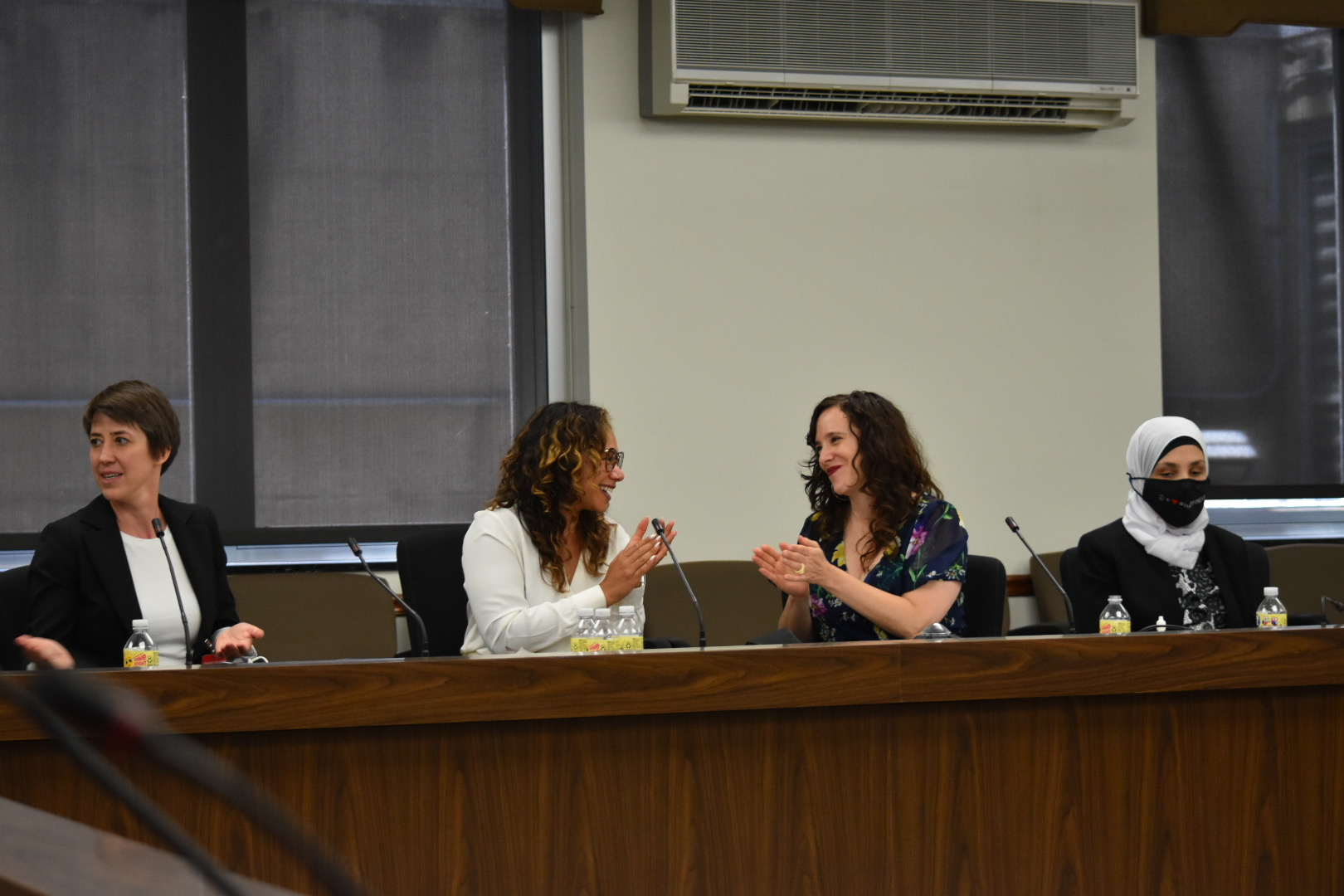
Karine Lepillez, Director of Gender Policy and Practice at Navanti Group, then introduced the panelists and began the discussion. Leading the discussion in “Storycorps” style, Lepillez allowed panelists to engage with each other and ask questions to the other panelists, in order to foster a closer understanding of their points of view. Lepillez began by asking the panelists about their experiences creating policies that navigate the multiple identities many people hold. Highlighting their experience working across offices in the State Department, the panelists noted that this was their second time speaking together since all three of them have been appointed. Special Advisor Minkara, who was appointed in late 2021, spoke on the importance of creating policy that reflects the needs of all people, especially those with multiple intersecting identities. Special Envoy Stern expanded on this, stating “diversity in government makes for better policies. You can’t just write about it in a strategy, you have to implement it and you have to resource it. It can’t just be words on a paper.” The next question posed to our panelists was relevant to their new careers within the State Department. Lepillez asked how the panelists have forged their own paths forward within new positions. She encouraged panelists to explain how they have worked within and outside of the existing gender-based model that agencies use for policy and practice in the government sphere.
For the last question of the panel, Lepillez asked about identity and its impact on the work done within foreign policy. This question was met with compassion by the panelists, as their work relates closely to their identities. Special Advisor Minkara spoke on the need for those with disabilities to get a seat, and a voice, at the table when discussing policy issues that directly or indirectly relate to disability rights. One could hear the passion and emotion in the panelists’ voices when discussing this question. Cormier Smith spoke on the power of people’s agency, stating “it’s not my job to be a voice for the voiceless. People have agency.” This question concluded the panel discussion and led the program into a question and answer section. With two questions from the audience, our panelists and Kat Fotovat expanded on the need for real action to be taken regarding women’s equality in the global sphere. Stern referenced that, “writing intersectional policy isn’t hard to do – it’s an excuse to say it’s hard to do. It’s not.” Cormier Smith, citing the differing needs of women in the United States compared to other countries, claimed, “we cannot apply a U.S. lens to the problem of global racism.” These remarks ended the discussion and brought the group to a networking opportunity where attendees discussed the conversation and the ways they engage in the work of intersectional foreign policy. Finally, the event concluded with remarks by Travis York of the Women’s Foreign Policy Group. They discussed the importance of this conversation and their hope for these types of conversations to continue in the future. WFPG’s Intersectionality in International Affairs panel discussion was a vital event to advance women’s foreign policy issues both in the United States and across the globe. Intersectional lenses and approaches to foreign policy are more essential now than they have ever been. In a growingly diverse global community, intersectionality allows policy makers to ensure all voices are being heard and all people are being protected and provided for in foreign policy decisions. Travis York is a student at Princeton University and a Communications Intern at the WFPG On Thursday, June 23, 2022, the Women’s Foreign Policy Group (WFPG) partnered with the Federal Republic of Germany’s Embassy and German Ambassador Emily Haber as part of our Embassy Series. This WFPG program hosts events at embassies, consulates, and diplomatic residences that facilitate conversations to highlight issues pertinent to the host country. Along with an opening and closing reception, the evening program titled “Ukraine and Germany’s Response,” was moderated by the award-winning CBS News Chief Foreign Affairs Correspondent Margaret Brennan. Brennan posed a series of topics to Ambassador Haber, ranging from the effects of the war on food security, the state of the energy industry, and current European geopolitical conflicts. 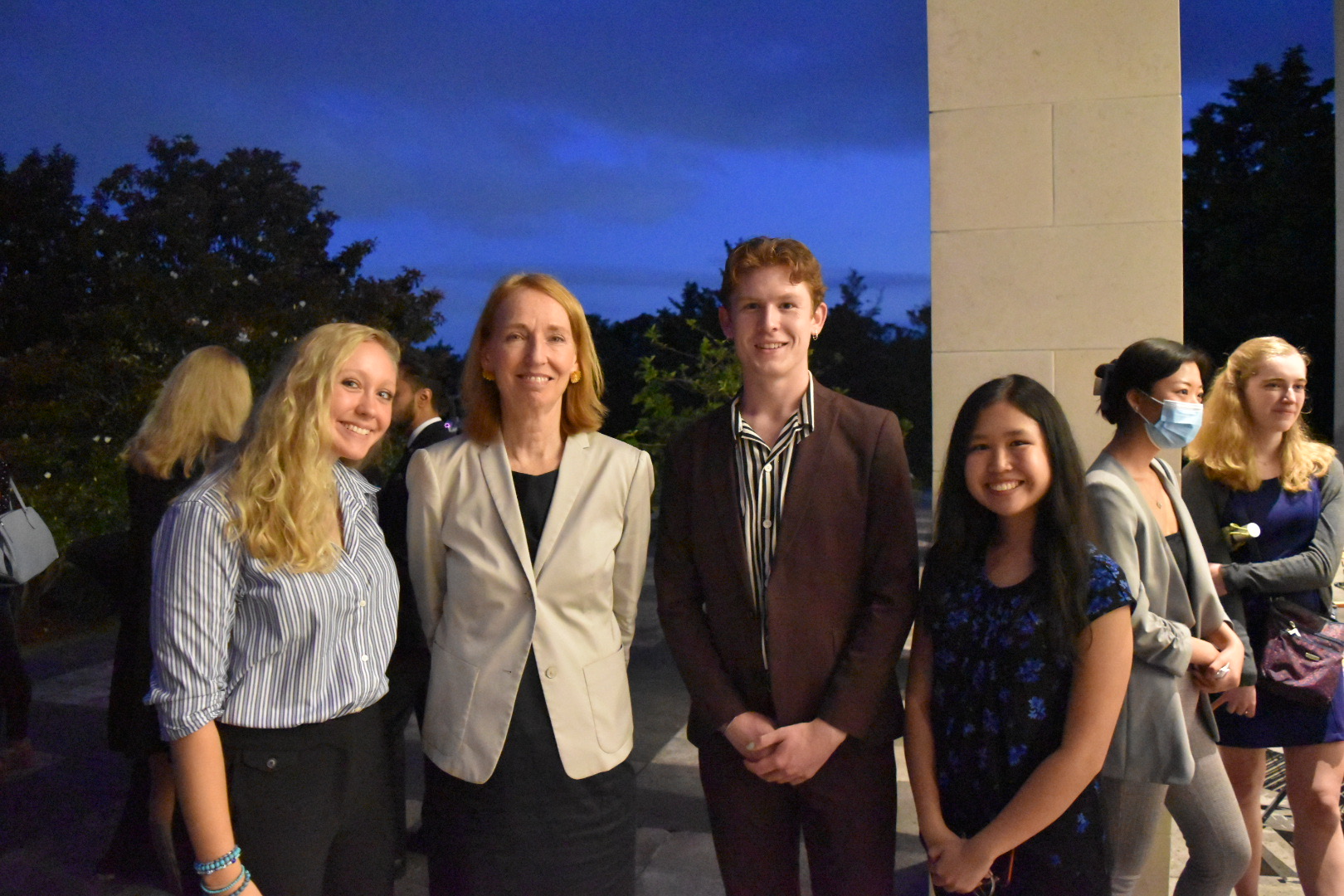
On the issue of food security, Ambassador Haber noted that food and fertilizers are being weaponized, and Russia prepared itself to use this to their advantage long before their invasion in February. Brennan mentioned that some experts surmise that increased food insecurity from the war is not imminent in 2022. Ambassador Haber pointed out that this is exactly the reason why action needs to be taken immediately to lessen the severity of the crisis that will emerge in the following years. She said allies of Ukraine must facilitate the export of grain from Ukraine, as the nation is among one of the top five global exporters and contributes to a third of the world’s wheat, maize, and sunflower oil. Additionally, it is a major supplier of the U.N. World Food Programme, the world's largest humanitarian organization focused on hunger and food security. As a result of Russia’s actions, the political instability in Ukraine has created direct risks for the 81 countries that draw on their assistance. With the gas and energy industries also pertinent for inclusion in discussions when assessing global impacts of the war in Ukraine, Brennan asked the ambassador about Germany’s current and projected positions due to connections the country has with Russia in these markets. Ambassador Haber expressed Germany’s support for Ukraine in the tragic state of conflict by noting that since Russia’s invasion, the country has decreased gas imports from Russia by 20 percent, creating agreements with Norway, Qatar, and the Netherlands to alternatively source their gas. She stated that by the end of the year, Germany will transition to importing no amount of gas from Russia. 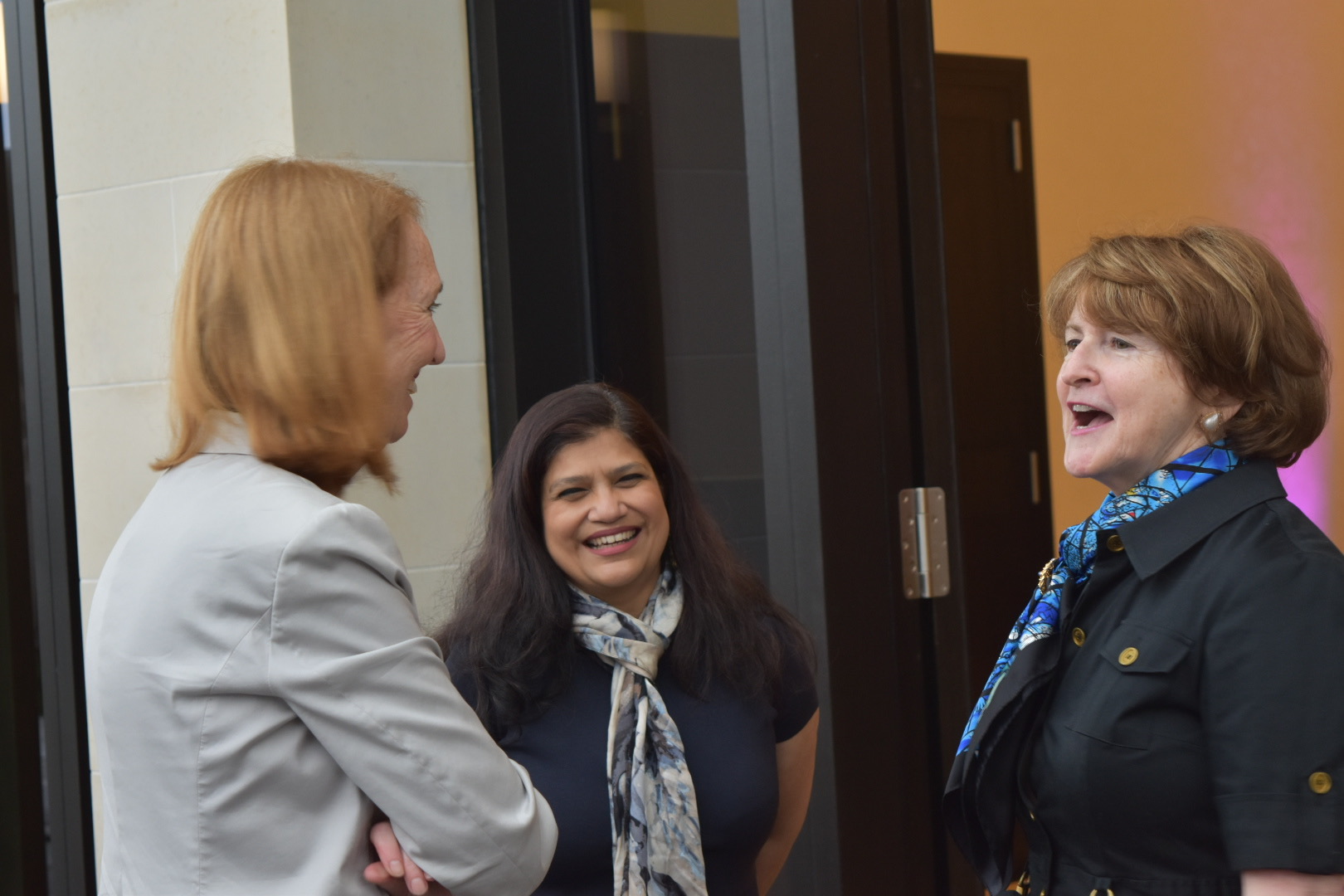
Speaking about geopolitical relations among various European and Eurasian nations, Brennen inquired into the causes that led Russia to invade Ukraine and how the public can best support Ukraine in this time of peril. Ambassador Haber responded that Russia believes a democratic Ukraine would be a threat to their attempts for dominant influence in the region. She voiced that the public should not believe the narrative that NATO was encroaching the border of Russia. Additionally, she emphasized the importance of paving a way for Sweden and Finland to join NATO as well as having Europe strengthen ties with Ukraine to establish improved relations for the future. Ambassador Haber acknowledged that Germany was at first slow in communication and action towards supporting Ukraine after the invasion, but reinforced her country’s commitment to showcase their solidarity for Ukraine by highlighting Germany’s work in sending state-of-the-art military supplies and civilian assistance. While repercussions towards Russia are necessary, Ambassador Haber believes that nations should take considerable care when acting upon sanctioning Russia for a number of reasons. For example, many policies enacted during the conflict will likely still be in place after the crisis is resolved and may be difficult to reverse, such as increasing military budgets in Europe. As Russian aggression has shifted its relationship that they will have with Europe and other countries, the “new Cold War”, as referred to by the German ambassador, has widened any type of crack that may have previously existed between Russia, Europe, and the rest of the global community. Responding to this monumental event in history, Ambassador Haber ended the evening program with highlighting the importance of unity in making decisions that are sustainable and focus on addressing issues with long-term trajectories, as the situation will evolve in ways no one can predict with certainty. The evening was very insightful on Germany’s perspective and actions responding to the war in Ukraine, and WFPG members along with esteemed guests appreciated the presence and interaction with honorary German Ambassador Emily Haber. As the first woman to hold the posts of appointed Political Director in 2009 and State Secretary in 2011, Ambassador Haber is a model inspiration for Women’s Foreign Policy Group’s mission to advance female leadership in international affairs and amplify their voices through substantive discussions on global issues. Ginger Matchett is a student at American University and a Programs Intern at the WFPG As June 2022 strides on and people around the United States begin to celebrate their pride, we must ask ourselves and our communities important questions of inclusion, diversity, and intersectionality. June commemorates LGBTQIA+ Pride Month; cities around the United States celebrate with weekends of parades, marches, and other events. We celebrate and uplift the queer voices that are often neglected by society at large. Throughout this celebration, we must remain critical of the intricacies of queer representation, espcially in the field of international affairs. In the world of international affairs, many queer people have been forced to take a back seat. Not only in policy impacting their abilities to live life to its fullest but also in the active role of being decision-makers in these political processes, queer people have been shunned out of the operation. This blatant evasion of inclusion, however, appears to be changing. Most recently, with the nomination of the first openly queer black woman to the position of Press Secretary, the LGBTQIA+ community can finally see themselves being taken seriously in the domain of politics and international affairs. On Thursday, June 30, 2022, when Karine Jean-Pierre took to the podium for the first time since her nomination as President Biden’s Press Secretary, the world was shaken. For the first time, the United States would have an openly gay black woman as its Press Secretary. The symbolic nature of Jean-Pierre addressing her nomination on the eve of Pride Month cannot be lost. As the United States kicks off a month of identity-based flags and rainbow-plastered business logos, we are seeing a woman break glass ceilings that have long been in place for her communities within the world of politics and international affairs. Jean-Pierre, a child of immigrant parents, notes the moment standing proudly, “This is a historic moment, and it’s not lost on me.” She hopes that her taking up of this position brings a spotlight to the possibility of success within politics and international affairs for queer children, black children, young girls, and anyone who finds themselves in her. Jean-Pierre represents a broader appearance of intersectionality within international affairs. Her identity as a woman, as black, as queer, and as a child of immigrants cannot be separated from each other. These identities are invaluable on their own; when looked at in combination, they appear overlapping and critical to each other’s valuehood. As young people look toward career options, they must be able to envision themselves in these positions to see their own success emerge. While possible, as shown by the many trailblazers of past and present, to forge one’s own path toward success, it becomes immensely more feasible with a helping hand, a beacon of success and hope, and a guiding light forward on one’s own path. Without consistent intersectional representation in international affairs and politics, how can society as a whole expect new voices to emerge within this realm? The WFPG celebrates its queer members and all those in the LGBTQIA+ community. As Pride Month strolls on, we commemorate LGBTQIA+ pasts, presents, and futures and work to uplift the voices of those often pushed to the interstices of society. There must be constant work to uplift intersectional queer comunities. This effort cannot end on June 30, 2022. Rather, we must continue the struggle for equality in international affairs throughout all of our work as individuals, organizations, and structures. Travis York is a student at Princeton University and a Communications Intern at the WFPG On June 2, 2022, the Women’s Foreign Policy Group (WFPG) partnered with the Committee for Human Rights in North Korea (HRNK) to host a speaker panel that provided an in-depth look into human rights in North Korea. The event featured Dr. Rana Siu Inboden, a Senior Fellow with the Robert S. Strauss Center for International Security and Law at the University of Texas at Austin, and Greg Scarlatoiu, the Executive Director of the HRNK. The discussion was moderated by Roberta Cohen and centered around how the North Korean government benefits from protection in the United Nations human rights system. Today, North Korea remains one of the most isolated and repressive countries in the world. Under the authoritarian rule of Kim Jong-un, the North Korean government has made significant efforts to tighten its grip on civil society and restrict the freedom of citizens. In 2014, the United Nations Commission of Inquiry published a report on human rights violations in North Korea and found that the regime was responsible for a multitude of crimes against humanity, including systematic torture, enslavement, forced disappearances, and sexual violence. Despite the North Korean government’s claims that women have equal rights with men, they are often the most common victims of human rights violations at state-run detention centers and prison camps. North Korean officials continue to deny any accusations of human rights abuses, flouting international law and enforcement mechanisms for human rights. While many international actors believe that the North Korean government should be investigated and charged for its crimes, numerous barriers stand in the way. During their conversation, Inboden and Scarlatoiu drew attention to one prominent challenge in particular. According to the two scholars, a disturbing development has emerged in recent years with authoritarian countries organizing to protect North Korea at international bodies, such as the United Nations. Inboden stated that this like-minded group of nations headed by autocratic leadership – including China, Russia, Syria, Iran, and Burundi – have sought to stifle attempts at conducting investigations and gathering evidence on human rights crimes committed by the North Korean government. Rather than condemning North Korea for violations of international human rights law, these countries have highly praised the government’s policies to reform healthcare and education. As noted by Inboden, the language used to commend the regime draws countless parallels to that of North Korean propaganda. In addition, this group of authoritarian countries has leveraged their power on the international scene to aid North Korea by criticizing economic sanctions as a mechanism to enforce human rights and providing “soft” recommendations to the United Nations Commission on Human Rights, such as proposals for vague legislation and international human rights treaties, which are difficult to enforce. Inboden argues that these recommendations are largely divorced from reality because they do little to impact the situation on the ground in North Korea, where citizens suffer from state repression in nearly every aspect of daily life. Inboden and Scarlatoiu believe that this pact of countries has joined together to defend North Korea on the international stage as an act of authoritarian solidarity and mutual defense against democratized nations. Both scholars agree that this development is highly troubling because it suggests elaborate coordination and orchestration among authoritarian states to shield the North Korean government from accountability for its infringements on human rights. Much like North Korea, these authoritarian countries have committed countless human rights abuses in the past, as illustrated by China’s genocide against its Uyghur population in Xinjiang and Russia’s recent war crimes in Ukraine. During the second half of the conversation, Scarlatoiu talked about potential solutions to addressing the problem of authoritarian solidarity in defense of North Korea. He stated that institutional change at the international level is a long and arduous process. As a result, dramatic changes to institutional processes, such as altering the balance of member-states at international institutions to favor democracies, are unlikely to succeed. Instead, Scarlatoiu emphasized the importance of civil society groups and non-governmental organizations (NGOs) as a way to bring about meaningful reform. Scarlatoiu leads a civil society organization himself, serving as the Executive Director of the HRNK, an NGO dedicated to bringing attention to the conditions in North Korea. Civil society groups and NGOs have published many highly successful and widely read open-source investigations in the past, making them essential to raising awareness and generating momentum about international issues. Despite the challenges, it is clear that cooperation between civil society and state governments is vital to holding North Korea accountable for its crimes against humanity and pressuring authoritarian countries to refrain from protecting the regime on the international stage. By doing so, the international community can better ensure that human rights norms are upheld for every citizen around the world. Tiana Ruden is a student at Princeton University and a Programs Intern at the WFPG As a WFPG intern and Young Professional Network member, I was thrilled to hear that Hon. Henrietta H. Fore was also a member of the organization. “As women, we have to lift each other up,” Henrietta Fore, former UNICEF Executive Director, said to WFPG members after her exit interview at CSIS. Henrietta Fore, a trailblazer for feminism in the international development sector, served as the first woman Administrator of USAID and Director of US Foreign Assistance. She has had an accomplished career in public service, the private sector, and nonprofit leadership across the areas of economic development, education, health, humanitarian assistance, and disaster relief. With her devotion to international development and women, it was no surprise that she discussed the importance of education for girls in her exit interview with CSIS. As girls have often been left behind in education in developing societies, especially during the COVID-19 pandemic, UNICEF has made girls education a priority issue for the organization to focus on. For girls to build better futures for themselves, participate more in their societies, and earn higher incomes, UNICEF emphasizes that it is imperative to provide girls with not just access to schools, but also to quality education. Fore spoke of UNICEF’s implementation of “occupational education” programs, where girls are taught skills that will be relevant and valuable for jobs, including communication and negotiation skills, critical thinking, and self-management. Moreover, the number one request out of adolescents is a modern education, which has led UNICEF to integrate technological education into their programs to ensure that children in developing countries are able to access education when they must be at home, such as during the COVID-19 pandemic. Girls in particular face pressure to be in the home for housework and family care, which has made re-entering education since the pandemic difficult. Henrietta has urged governments to invest further in education, especially for marginalized children, so they can remain in school through the pandemic by providing catch-up classes, mental health and nutrition support, vaccines, and digital connectivity, to uphold UNICEF’s mandate, “no child left behind.” Under Fore's leadership, UNICEF successfully implemented programs to mitigate the issue of girls out of school that the pandemic has exacerbated. UNICEF has worked with the governments of Ghana, South Sudan, and Zimbabwe, for example, to boost girls as schools reopen through Back-to-School campaigns, online and offline lessons, and catch-up programs. Some of UNICEF’s strategies to influence government policy include Skills4Girls, Building Back Equal: Girls back to school guide, and Reimagining Girls’ Education: Solutions to Keep Girls Learning in Emergencies. These tools enable countries to put girls' education at the forefront of their priorities and ensure that girls are being encouraged and supported to receive their education. Fore discussed UNICEF’s focus on girls’ education in particular, which really resonated with WFPG’s YPN members attending the interview. Part of our mission at WFPG is to amplify women’s voices, and Henrietta did that in her discussions, encouraging all YPN members to support other women near and far, prioritize girls’ education, and continue speaking up. Henrietta very aptly mentioned in her interview, “If you give a girl an education, you open up every opportunity for her, but the payback, the reward, the return to the world is enormous.” As young women explore and navigate their futures, we create the change, and prioritize uplifting other women, here in our own country, in developed nations, and in other developing countries around the world. Thank you Henrietta Fore for leading by example and sharing the beacon of hope for future young professionals like us. Skye Jannery-Barney is a student at The George Washington University’s Elliott School of International Affairs and a programs intern at the WFPG 
In the past year, many countries have taken concrete steps to address gender inequity in a holistic and intersectional way, enforcing legal mechanisms to support the progression of women and other vulnerable populations. The Generation Equality Forum (GEF) last year supported the enactment of these changes, with commitment-makers such as the US and Mexico, paving the way to begin the process of mainstreaming gender equality in policymaking, resource allocation and discourse.
While this is a productive start, it is not enough to eliminate deeply ingrained systems of oppression in our lifetime. The following are just a few examples that illustrate how far we as a global society still are from intersectional gender parity. Reminders to Keep Fighting North America
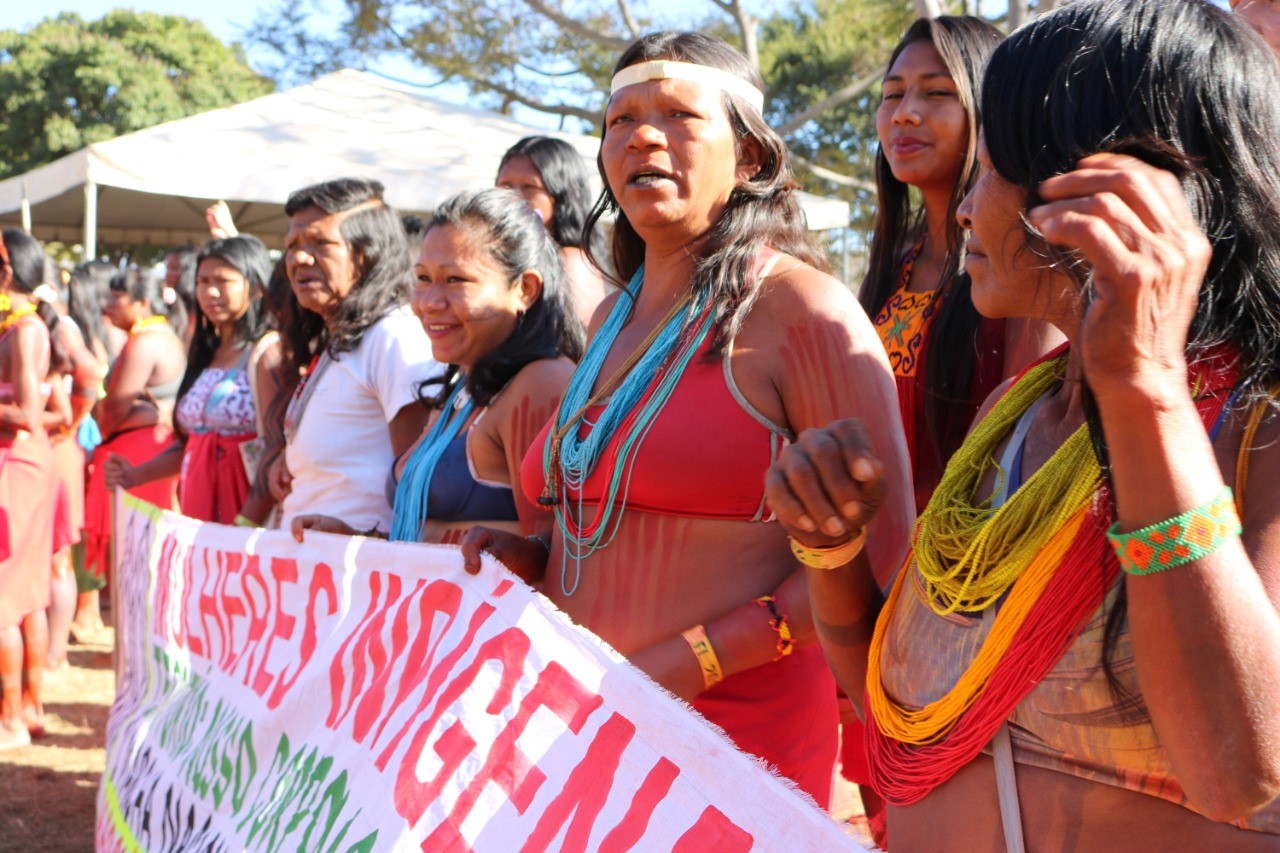
Last year, in the first major gender conference held since Beijing, the GEF was able to bring together leaders across the public, private and civic sector, to acknowledge and commit to the importance of gender with dedicated and comprehensive action and accountability. The GEF summits acted as a watershed moment in highlighting the need for mainstreaming gender across all sectors, and for allocating resources in support of gender-related goals. And despite the challenges that we’ve seen to equality around the world in the past year, the GEF’s advocacy and coalition-building can nonetheless support the global community in laying the groundwork to achieve irreversible gains through targeted legal, political and corporate reforms. While institutional change can be slow, the GEF’s actions to date and its five-year commitment to intersectional gender parity, give us hope that we are on the right path to realize the full rights and dignity of all. Ainab Rahman is a gender and security practitioner, and a member of the WFPG. She currently serves as Director at a global strategic advisory and intelligence company.
Photo Caption: Brazil’s indigenous women have been at the forefront of the fight against the “ecocide” being carried out by Bolsonaro. Return to top 
I was deeply saddened to learn of the death of Madeleine Albright, an outstanding woman leader, and role model, whose appointments as first US woman Ambassador to the UN and first US woman Secretary of State inspired women worldwide. I have many fond memories of Madeleine who I got to know when I was covering foreign affairs for the MacNeil-Lehrer Newshour and she was a professor at Georgetown University. I had the privilege of putting her on TV for the first time, which she joked “made her famous”.
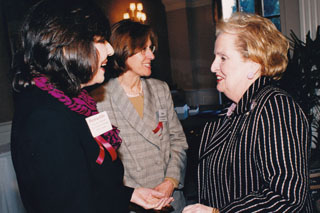 Always a strong supporter of mentoring and making space for women at the table, Madeleine was actively engaged in launching the WFPG’s mentoring program in the very early days of the organization, when she would bring her students for informal career conversations with WFPG members. Always a strong supporter of mentoring and making space for women at the table, Madeleine was actively engaged in launching the WFPG’s mentoring program in the very early days of the organization, when she would bring her students for informal career conversations with WFPG members. Later, while at the UN, Madeleine convened a group of all the women permanent representatives, which at that time numbered only seven including herself. The group has since grown and the women ambassadors to the US have organized a similar active group in Washington. The WFPG is proud to continue this tradition of convening and connecting women diplomats, as well as honoring them and their achievements through activities like our Annual Celebration of Women Diplomats and our annual Guide to Women Leaders in International Affairs. 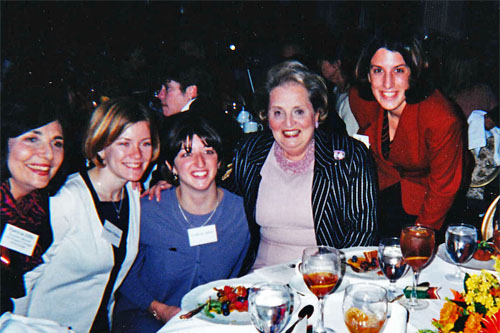 Madeleine spoke to WFPG members several times over the years. In 2000, on the occasion of the WFPG’s fifth anniversary, Madeleine addressed a packed audience of WFPG members and guests in her last speech as Secretary of State. This started the WFPG tradition of hosting an annual benefit luncheon to honor top women leaders and officials and hear their insights on pressing issues of the day. Madeleine spoke to WFPG members several times over the years. In 2000, on the occasion of the WFPG’s fifth anniversary, Madeleine addressed a packed audience of WFPG members and guests in her last speech as Secretary of State. This started the WFPG tradition of hosting an annual benefit luncheon to honor top women leaders and officials and hear their insights on pressing issues of the day. I am honored that I had the chance to know and work with this amazing woman leader, who contributed so much to American foreign policy, to advancing women’s leadership world-wide, and to the WFPG and its mission. Madeleine Albright inspired a generation of women leaders to aim high and to bring others along with them. We are eternally grateful for all she did to encourage, support and lift up women. Watch Madeleine Albright’s comments as part WFPG’s 20th anniversary tribute video Patricia Ellis is the Co-founder and President Emeritus of the Women’s Foreign Policy Group. Photo Captions: (1) Patricia Ellis greeting Secretary Madeleine Albright at the WFPG’s 5th Anniversary Celebration, (2) Secretary Madeleine Albright meeting WFPG interns at the organization's 2000 benefit luncheon Return to top 
As Women’s History Month comes to a close, we celebrate the social, economic, cultural and political achievements of women, and the advancement of gender equality goals, across the world. But as we celebrate those achievements, we are also reminded of how much work we are left to do. Progress on gender equality has been slower than expected across all countries, and has even regressed due to the pandemic, with the World Economic Forum stating that if we continue at current levels, “it will now take 135.6 years to close the gender gap worldwide.”
Last year witnessed the first penultimate conference on gender since the seminal Beijing Declaration 26 years ago. The Generation Equality Forum (GEF), a multi-event summit hosted in Mexico City and Paris, brought together leaders from across the public and private sector to address the global lack of progress on gender equality, in an effort to course correct global inaction on this front. While many countries have paid lip service to the ideas of gender equity throughout the years, most public commitments have not been met with adequate action, financing or implementation of laws, policies and programs needed to truly meet the goals of equality. The GEF set out to change this, holding accountable global leaders to their pledges to eliminate gender inequalities and realize the human rights of womxn and girls, with unprecedented concrete commitments from the public and private sector. The GEF raised over $40 billion towards its 5-year plan to accelerate equality, leadership and opportunity for women and other disadvantaged groups. The summit galvanized participants from government, civil society, academia, international organizations and multinational corporations around its moment for transformative change. Almost one year later, what progress has been made for equality around the world? Wins for Women North America
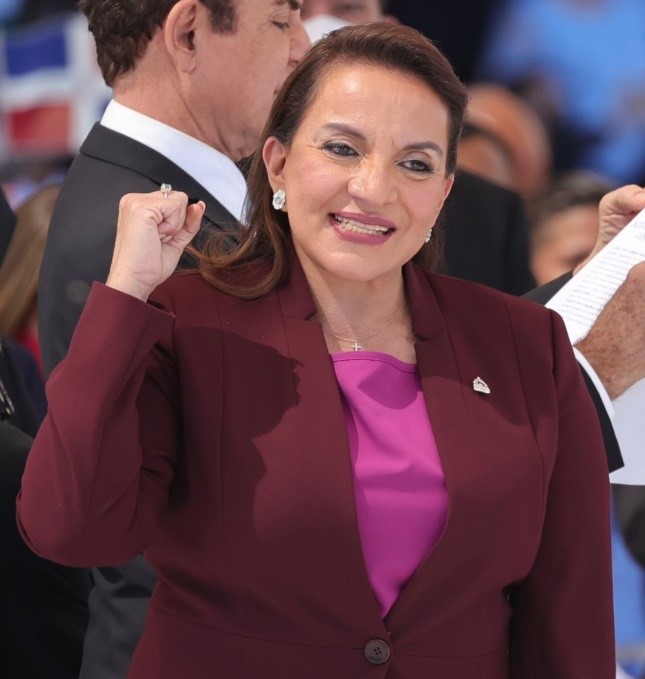
Ainab Rahman is a gender and security practitioner, and a member of the WFPG. She currently serves as Director at a global strategic advisory and intelligence company.
Photo Caption: Xiomara Castro, Honduras’ first woman President. Return to top 
The 24/7 media coverage of Ukraine gives us a constant feed of the devastation and destruction that has irreparably damaged countless lives, a result of the despotic machinations of one man’s hyper toxic masculinity.
The war in Europe’s backyard is horrifying and tragic—all wars are—but it should come as no surprise. Putin’s rise to power and the cultivation of his hyper toxic masculinity did not occur in a vacuum, but in a socio-political system where hyper militarization, nuclearization, and violence are privileged as the only methods to acquire and maintain power. Hard power is the only mechanism of enforcement, coercion and deterrence in a patriarchal system; and thus, war is the inevitability. “The opposite of patriarchy isn’t matriarchy—it’s a non-warring society”. Recognizing the need to integrate gender mainstreaming in the prevention of war and conflict, UN Women’s Generation Equality Forum (GEF) created the Compact on Women, Peace and Security and Humanitarian Action. 25 years after the adoption of the Beijing Declaration and UN Security Council Resolution 1325, this Compact sets out to redesign systems of peace and security in alignment with gender mainstreaming principles. The underlying principle of this framework centers on the idea that the inclusion of women and their needs is critical in preventing and addressing conflict and peace building. Had global governments previously adopted more of these policies in its practices, perhaps it could have prevented the current invasion. Putin has long signaled his appetite for expansion, his actions and rhetoric abetted by the complicity of other hyper toxic masculinist leaders, including the former President Trump, who has continued to laud the Russian ruler’s actions of war under the guise of ‘peacekeeping’ as “genius” and “very savvy”. Despite issuing sanctions at the behest of his Administration, President Trump had taken a number of pro-Russia stances that enabled Putin to grow his military, nuclear and cyberwarfare capabilities without hard-hitting consequence. Under an Administration that did not adopt any principles of gender mainstreaming, the US enabled an acceptance of other authoritarian leaders, such as the Taliban, Bolsanaro, Orban, as well as anti-democratic leaders, such as Netanyahu and Modi, two countries with which the US continues to have strong ties. As an advocate of feminist approaches to policy, I struggle with the strategy to address the Russian invasion within a gender mainstreamed security framework. Theoretically, a gender-focused philosophy would be against arming groups and against the enforcement of increased militarization, and would instead advocate for diplomatic and soft power approaches. But when these fail, are we forced to resort back to violence? 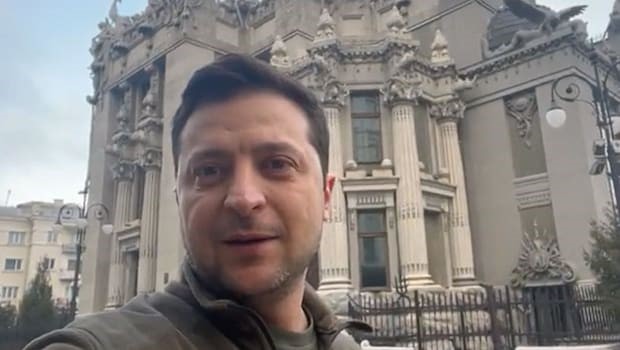 The introduction of an extreme targeted sanctions regime across multiple countries and financial platforms is laudable—and sanctions against the Central Bank of Russia are unprecedented—but will they be enough? Though the Russian leader has declared western sanctions to be an act of war, Putin and his associates have taken measures to hedge against the loss of their wealth by transferring liquid assets to gold or cryptocurrency, as well as hiding assets behind complex shell companies. The introduction of an extreme targeted sanctions regime across multiple countries and financial platforms is laudable—and sanctions against the Central Bank of Russia are unprecedented—but will they be enough? Though the Russian leader has declared western sanctions to be an act of war, Putin and his associates have taken measures to hedge against the loss of their wealth by transferring liquid assets to gold or cryptocurrency, as well as hiding assets behind complex shell companies. Private companies taking measures against Russia’s actions have also worked to cripple Russia’s economy, from tech companies to oil supermajors. But Russia has worked to secure its trade relationships with China and Middle Eastern countries. Cybergroup Anonymous declared cyberwar against Russia, targeting state-run media outlets and disinformation operations critical to the country’s war effort. None of these softer approaches have acted as a deterrent. Putin continues a war which costs $20 billion a day and much more in casualties. The UN estimates that over 2 million Ukrainians have already fled the country and that 12 million people inside the country will need relief and protection in the coming months. Ukraine’s President Zelensky has called for increasing arms and ammunition aid, prompting NATO countries to increase military aid to the country to an unprecedented level. He has also called for on-the-ground support, appealing to global citizens, especially veterans, to come to his country’s defense. Increased militarization may be the only way to triumph over a hyper-masculinist and irrational tyrant. But that still begs the question, are we rejecting feminist foreign policy by engaging in an escalating military conflict, or are staying true to its key goal of protecting the most vulnerable and ensuring the defense of democracy, equality and freedom? Ukraine’s President Zelensky, who is reported to have said, “I need ammunition, not a ride”, rejecting the US’ offer of immediate evacuation from the capital. Author’s note: I’m heartened watching the global community come together to support Ukraine and the ideals of democracy and freedom. I hope that the kindness, compassion and cooperation that the international community continues to show Ukraine and white Ukrainians will also be offered to others around the world that are victims of war and conflict, and those that have been displaced from state sanctioned genocidal campaigns, and unjust territorial occupation. Ainab Rahman is a gender and security practitioner, and a member of the WFPG. She currently serves as Director at a global strategic advisory and intelligence company.
Photo Caption: Office of the President of Ukraine  Mainstream culture, media and society acknowledges racism as historic inequality faced by the BIPOC communities, and in the American context, the mistreatment and discrimination of Blacks by whites, from slavery through Jim Crow. When we think of racism we think of explicit symbols and isolated acts of white supremacy and racial hatred–the KKK’s white hoods, swastikas, hate crimes, explicitly racist jokes and slurs. This definition is much easier to understand, absorb and acknowledge. It’s easy to call out. It’s visible. It’s unequivocally morally wrong.
Addressing the more complex and intersectional definition of racism as systemic injustice, perpetuated on a daily basis by our socio-economic and political infrastructure, is much less palatable. It disturbs white fragility, a term coined by Robin DiAngelo to describe the disbelieving defensiveness that white people exhibit when their ideas about race and racism are challenged—and particularly when they feel implicated in white supremacy. For those that have white privilege, it’s difficult to address the cognitive dissonance that this realization brings; it’s difficult to acknowledge one’s own role in acting in a system from which they benefit from the oppression of BIPOC. But for BIPOC, systemic injustice is our reality.
We are reminded every day by a political system that does not represent our interests. By a law and order system which profiles us as the enemy; that shows us that human rights are only for those that are white. By a media that reinforces whiteness as the standard of beauty. By an education system which teaches us that our oppressors and enslavers are national heroes; that white history is the only history. By a culture that tells us we need to appropriate to whiteness; that we must change or erase the visible markers of our cultural identity that make us the Other. By national narratives that exclude or altogether erase our voices and spaces. By landscapes littered with reminders of our subjugation, from statues of ‘leaders’ that didn’t believe that we were human, and actively worked to endorse and normalize myths of the inferiority of BIPOC. If you are not a BIPOC, it’s easy to forget that the system profits from the denial of BIPOC’s humanity, especially if you do not have to confront that reality every day. It’s easy to ignore the intersectional systems of oppression that are perpetuated in maintaining white privilege and keeping BIPOC subjugated.
Last year’s Generational Equality Forum (GEF), the largest summit for gender equity since the watershed Beijing Conference, centered the idea of intersectionality and multi-sectoral approaches as pivotal to its goal of achieving gender justice.
As one GEF speaker summarized, “the politics of exclusion undermine gender priorities”, reinforcing the idea that the fight for gender equality is inextricably linked to the fight for equality for all vulnerable groups, not just women. This is why anti-racism action must be an integral element of gender equality.
Some corporate commitment-makers have recognized this explicitly, with their promise of institutionalizing policies of equal pay to women as well as BIPOC, and increased representation of women and BIPOC on their teams.
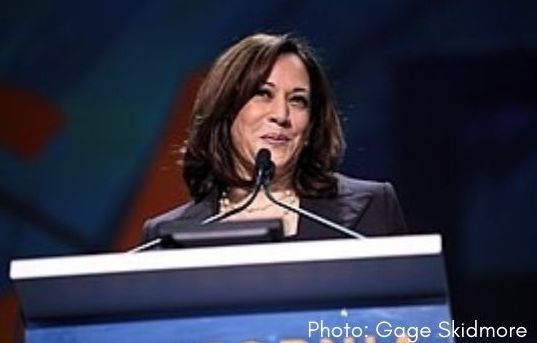 Other organizations committed to shifting attitudes and beliefs about power and privilege, with their promise to conduct targeted norms interventions, dedicated workshops and Antiracism Taskforces to inform their work. Other organizations committed to shifting attitudes and beliefs about power and privilege, with their promise to conduct targeted norms interventions, dedicated workshops and Antiracism Taskforces to inform their work. But the GEF community has to ensure that these actions go beyond performative allyship, and that commitment-makers are able to concretely measure inclusivity and anti-racist transformation on both a cultural and operational level. As Angela Davis says, “It’s not enough to be not racist, you must actively be anti-racist. White people need to hold themselves and their white community accountable for addressing and attacking the very system that needs to be destroyed in order for BIPOC communities to stay alive and be well.” Equality does not exist in silos. As long as we allow any of these systems – whether racial or patriarchal – to exist, we will only reinforce our own inequalities.
Ainab Rahman is a gender and security practitioner, and a member of the WFPG. She currently serves as Director at a global strategic advisory and intelligence company. Photo Caption: One of the opening speakers for the event, US Vice President Kamala Harris reinforced the importance of inclusivity by noting “our world is stronger when everyone participates”. She asked the community “to listen to those who are not being heard, to recognize those who are not in the room and invite them in, and to respect and embrace those whose experiences are different from yours.” |


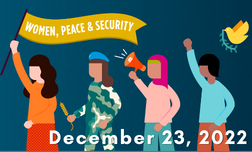
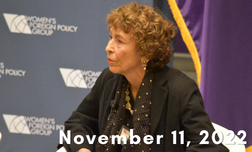

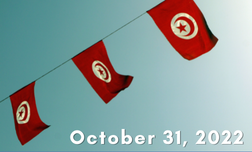
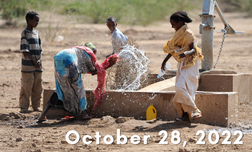
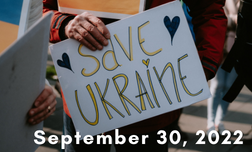
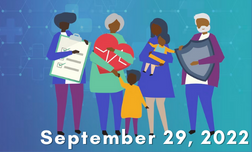
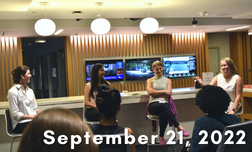

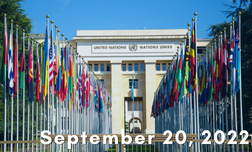
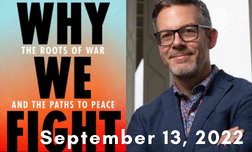
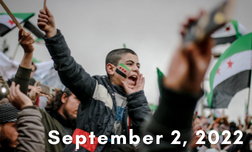
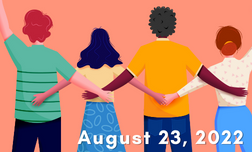
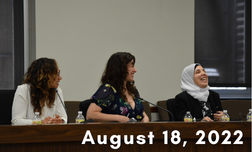
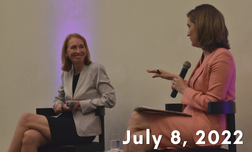
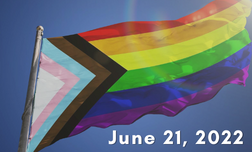
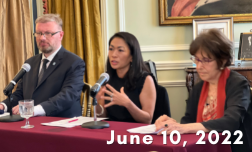
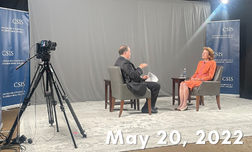
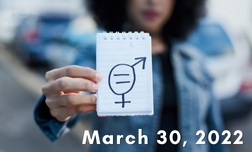
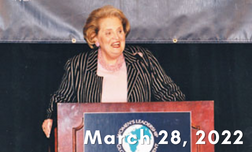
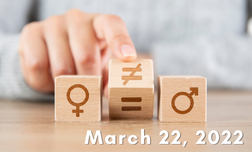
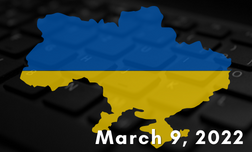
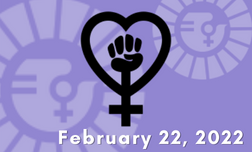















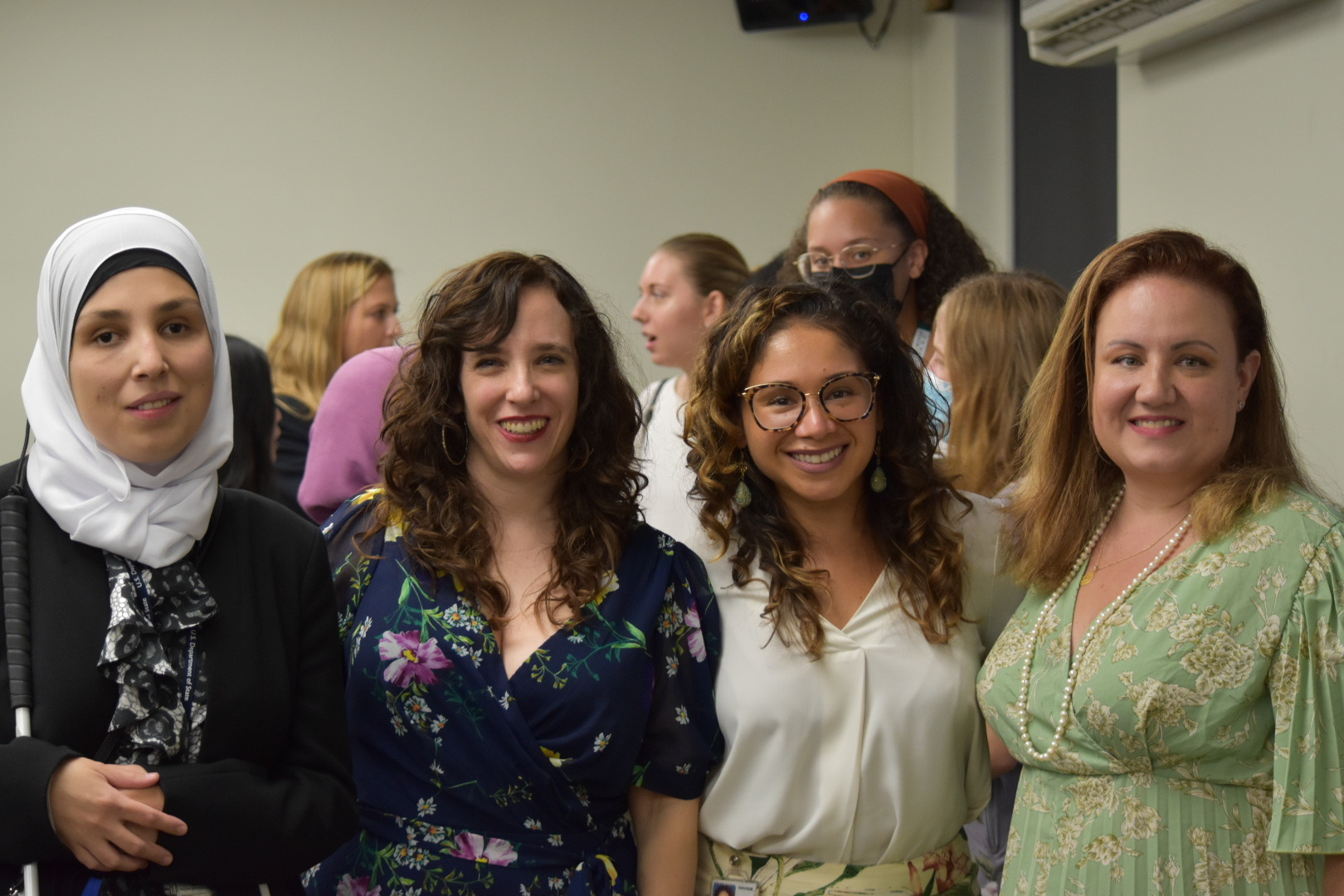 Referencing the importance of having an intersectional approach to foreign policy issues, Special Representative Cormier Smith spoke on her desire for “bring[ing] this paradigm shift to the State Department.” The panelists proceeded to ask each other what systems they are trying to incorporate into their work in order for their positions to continue to make progress.
Referencing the importance of having an intersectional approach to foreign policy issues, Special Representative Cormier Smith spoke on her desire for “bring[ing] this paradigm shift to the State Department.” The panelists proceeded to ask each other what systems they are trying to incorporate into their work in order for their positions to continue to make progress.


